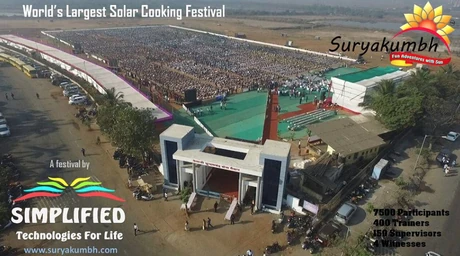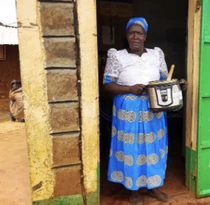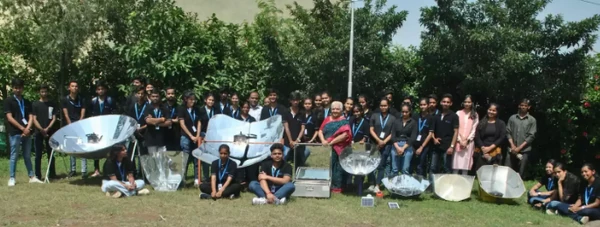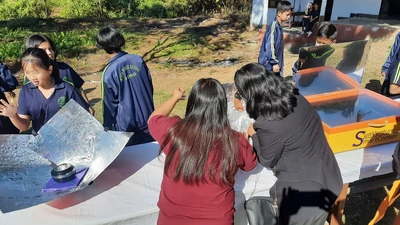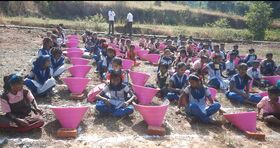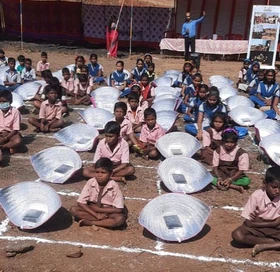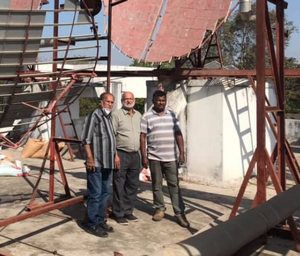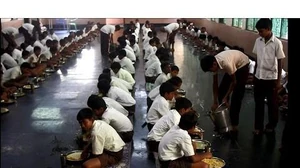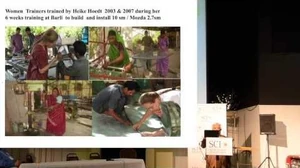Paul Hedrick (talk | contribs) |
Tom Sponheim (talk | contribs) m (Reverted edits by 103.100.219.66 (talk) to last revision by Paul L. Hedrick) Tag: Rollback |
||
| (760 intermediate revisions by 18 users not shown) | |||
| Line 1: | Line 1: | ||
{{GoogleTranslateLinks}} |
{{GoogleTranslateLinks}} |
||
| + | {{Updated|3|21|24}} |
||
| + | |||
| + | {{CountryPageHeader|Suryakumbh_aerial_photo_2017.png|'''SuryaKumbh festival again sets record''' - [[Vivek Kabra]] reports: "On 11 Feb, 2017, approximately 7,500 school children created history by participating in the World's Largest Solar Cooking Festival. Trained by 400 trainers and guided by 150 supervisors, each one of them made their own solar cooker and cooked noodles in it. Having experienced the power of the sun first hand, each child took the SuryaKumbh solar cooker back home to share the magic of cooking without fuel." The event this year was organized by the Mira Bhayander Municipal Corporation and held in the Bhayandar-Thane area. Aerial view of the 7,438 school children learning the basics of solar cooking at SuryaKumbh 2017 - ''Photo credit: Vivek Kabra.''[http://www.hindustantimes.com/mumbai-news/to-set-a-record-7-438-mumbai-school-students-cook-noodles-in-solar-cookers/story-jBM24sR2Qex77JIbR3S4bN.html More information...]}} |
||
==Events== |
==Events== |
||
{{IndiaEvents}} |
{{IndiaEvents}} |
||
| + | {{CalendarAndPastEvents}} |
||
| + | =={{FeaturedProjectTitle}}== |
||
| − | See also: [[Calendar of events]] |
||
| + | [[File:Shirdi_roof_collector_array.jpg|thumb|350px|Shirdi roof collector array]][[File:Shirdi_collector_diagram.jpg|thumb|300px|Shirdi collector array diagram]][[File:Shirdi_cooking_photo.jpg|thumb|300px|Cooking in the kitchen at Shirdi]] |
||
| − | ==News and Recent Developments== |
||
| + | *'''Rooftop solar installation feeds 50,000 people per day:''' [[Gadhia Solar Energy Systems Pvt. Ltd.]] completed installation of a solar steam cooking system, capable of cooking 40,000-50,000 meals per day. It is located at Shirdi Sai Baba temple in Shirdi, Maharashtra, India. With nearly 30,000 visitors each day, the temple’s dining halls are some of the largest in India. The solar steam cooking system is comprised of seventy-three rooftop-mounted [[Scheffler Community Kitchen|Scheffler reflectors]] of sixteen square meters each. The dishes concentrate sunlight on receivers that contain water, generating steam that is piped down to the kitchen for cooking purposes. To maintain constant focus with the sun, the dishes automatically rotate throughout the day after being manually aligned once each morning. The solar steam cooking system is retrofitted to existing liquid petroleum gas-powered steam boilers that are still used in the evening and during prolonged periods of inclement weather. Though the solar steam cooking system cost nearly $300,000, government subsidies reduced the temple’s portion to about $170,000. Liquid petroleum gas use has been cut by roughly 100,000 kilograms each year, for an annual savings of approximately $45,000. The temple should recoup its investment in three to four years. According to company founder [[Deepak Gadhia]], the solar steam cooking technology was originally developed in Germany. However, the equipment does not contain imported components, and is manufactured with local machinery and labor, creating much-needed jobs. Gadhia has adapted the system for use in India, and has installed 50 such systems of varying sizes over the past two decades. The March edition of CNN’s Eco Solutions program highlights the Shirdi Sai Baba temple solar steam cooking system. |
||
| − | *'''February 2013: Solar cooking and processing workshops in India''' - [[Celestino Ruivo]], of the [[Escola Superior de Tecnologia da Universidade do Algarve|Instituto Superior de Engenharia da Universidade do Algarve]] in [[Portugal]], traveled to [[India]] at the end of January to attend the 1st International Solar Food Processing Network workshop at the Muni Seva Ashram in Goraj, Vadodara, Gujarat, India. He brought with him 50 kg. of solar cooking bagage: 8 black pots, 16 glasses of windows cloth washing machines, corrugated sheet metal, reflective foil and tools to make low cost and effective portable funnel cookers. Creatively, Celestino used his suitcase as the mold to construct examples of his [[Celestino Solar Funnel Cooker|solar funnel cooker]] in concrete. He also gave a lecture about solar cooking and how to construct a funnel cooker at the CT institute in Punjab for more than 300 students, as well teaching solar cooking for ladies in domestic context at Jalandhar. The eight funnel cookers were donated to friends in Hyderabad, Mumbai, Muni Seva Ashram, Vadodara, Jalandhar and New Delhi. |
||
| + | {{Clr}} |
||
| + | [[File:Suryakumbh_aerial_photo_2017.png|thumb|400px|Aerial view of the 7,438 school children learning the basics of solar cooking at SuryaKumbh 2017 - ''Photo credit: Vivek Kabra'']] |
||
| + | *{{NewFeb17}}'''SuryaKumbh festival again sets record for largest solar cooking workshop''' - [[Vivek Kabra]] reports: "On 11 Feb, 2017, 7,500 school children created history by participating in the World's Largest Solar Cooking Festival. Trained by 400 trainers and guided by 150 supervisors, each one of them made their own solar cooker and cooked noodles in it. Having experienced the power of the sun first hand, each child took the SuryaKumbh solar cooker back home to share the magic of cooking without fuel." The event this year was organized by the Mira Bhayander Municipal Corporation and held in the Bhayandar - Thane area. [http://www.hindustantimes.com/mumbai-news/to-set-a-record-7-438-mumbai-school-students-cook-noodles-in-solar-cookers/story-jBM24sR2Qex77JIbR3S4bN.html More information...] |
||
| + | {{Clr}} |
||
| + | [[File:Jimmy McGilligan Centre for Sustainable Development, 3-7-22 copy.jpg|thumb|300px|[[Jimmy McGilligan]] demonstrates a large [[:Category:Parabolic solar cooker designs|parabolic solar reflector]] to local women. ''Photo credit: Janak McGilligan'']] |
||
| + | *'''Jimmy McGilligan Centre for Sustainable Development and the Barli Development Institute for Rural Women''' - The long lasting partnership of [[Janak McGilligan]] and [[Jimmy McGilligan]] has provided a depth of solar cooking instruction for rural residents in [[India]], beginning their work in 2008. Since that time, the two facilities, the [[Jimmy McGilligan Centre for Sustainable Development]] and the [[Barli Development Institute for Rural Women]], have trained over 150,000 youths in solar cooking, and over 6,000 rural and tribal women from over 1,000 villages to be community workers and trainers for solar cooking. They have shown communities that solar cookers can prepare their traditional and community foods with no problem, and have supervised the installation of many [[Scheffler Community Kitchen]]s. Their projects have helped the self esteem of the local women, and created opportunities for them to use solar cooking to establish businesses that continue to provide community revenue. Jimmy passed away in 2011, but as of 2022, Janak continues to carry on their valuable work. [https://www.youtube.com/watch?v=43pHZv815Zo Watch Janak McGilligan recall their work at CONSOLFOOD 2022] |
||
| + | {{SignificantProjectLink}} |
||
| − | [[File:Solar_Food_Processing_Network_group_photo,_2-14-14.jpg|thumb|300px|Participants at the 2013 Solar Food Processing Network conference.]] |
||
| − | *'''February 2013:''' The [[Solar Food Processing Network]] (SFPN) held a regional workshop in January 2013 at the Muni Seva Ashram in Goraj, Vadodara, Gujarat, [[India]]. This gathering was a follow-up to the 2009 AFPN conference held in Indore, India in 2010. Workshop participants heard from food marketing and technology experts. Conference organizers, [[Deepak Gadhia]] and [[Rolf Behringer]] held discussions on local and international marketing, village industries, packaging, policy interventions, R&D, and effective monitoring and evaluation of projects. Attendees discussed the formation of an international solar food standard and shared their own practical experiences using solar technology for food processing. Visit the [http://www.solarfood.org Solar Food Processing Network] to see a muscial video of the event and videos of solar food processing projects in [[Burkina Faso]]. |
||
| + | =={{HeadingNews}}== |
||
| − | [[File:Worlds Largest Solar Cooking Class|thumb|right|300px|2,044 middle school students learn to prepare lunch with solar cooking.]] |
||
| + | [[File:Janak McG, 3-11-24.png|thumb|300px|The men prepared a solar cooked lunch for the women, ''Photo credit: India News Calling'']] |
||
| − | *'''January 2013: World's largest solar cooking class takes place in India''' - On January 19, 2013, middle school students gathered on the grounds of JES College in Jalna, [[India]] to be trained in the use of a simple [[solar panel cooker]]. After a quick breakfast, and guidance from 205 trainers, a record-breaking 2,044 students assembled their own solar cooker and placed prepared ingredients inside to cook. After speaker presentations, they were able to enjoy the lunch they had cooked themselves. This event, sponsored by Simplified Technology for Life, demonstrates that India is quite serious about introducing solar cooking to young students. |
||
| + | *{{NewMar24}}'''March 2024: Men cooked and served a solar lunch for the women to celebrate International Women Day March 8, 2024''' - Men organized and hosted a solar Lunch at [[Jimmy McGilligan Centre for Sustainable Development]] in the village Sanawadiya in [[India]]. They celebrated International Women's Day in a unique way. This year, many men specifically learned how to solar cooking, and cooked a solar lunch for the women. The event was attended by 30 participants, including [[Janak McGilligan|Dr. Janak Palta McGilligan]]. [https://www.indianewscalling.com/news/149800-men-cooked-and-served-solar-lunch-to-women-to-celebrate-international-women-day-march-8-2024-.aspx Read more...] |
||
| + | {{Clr}} |
||
| + | [[File:Shri Amarnath Ji Yatra cooker, 12-15-23.png|thumb|300px|The [[Scheffler Community Kitchen]] installed for Shri Amarnath Ji Yatra 2023, ''Photo credit: Swaaha'']] |
||
| + | *{{NewDec23}}'''December 2023: Mega solar cooker in the Himalayan Mountains ''' - A presentation was made at COP28 by Sameer Sharma, CEO and Co-founder of Swaaha. He relates the story of how large [[Scheffler Community Kitchen]] solar cookers were installed high in the Himalayan Mountains, for the two-month festival Shri Amarnath Ji Yatra 2023. The new solar cookers, while used in conjunction with [[biomass]] and biogas sources, generated considerable interest by providing a sustainable way to prepare three daily meals for over 2,400 Hindi pilgrims. In all, over 500,000 people, who visit the high-altitude holy site during the one month festival, viewed the solar cooker and received information on how they could have this technology at their own home locations. His presentation begins at 21:00 of the accompanying video, which begins with a worldwide solar cooking overview provided by [[Solar Cookers International]] personnel. |
||
| + | ::[[File:Solar Cooking – A Pathway to Emissions Prevention and Climate Crisis Mitigation-3|400px|thumb|none]] |
||
| + | [[File:Janak McGilligan ISES 2023, 11-1-23.png|thumb|300px|[[Janak McGilligan]] addresses the [https://www.swc2023.org/home-swc-2023 Solar Energy Conference 2023] in New Delhi, ''Photo credit: GeoTv'']] |
||
| − | [[File:Parabolic solar cooker (Demo)|thumb|right|300px|The [[PRINCE - 40]] is demonstrated at the rural schools.]] |
||
| + | *{{NewNov23}}'''November 2023: '''The [https://www.swc2023.org/home-swc-2023 Solar Energy Conference 2023], organized by Germany-based [[International Solar Energy Society]] (ISES), was held in New Delhi, [[India]]. [[Janak McGilligan]] was invited as a speaker at the “Solar Thermal Cooking” session. ISES has included Janak among the 200 Renewable Energy Pioneers of India in its commemorative booklet ‘Century of Solar Stories and Renewable Energy Vision’. [https://geotvnews.com/solar-cooking-pioneer-in-india-janak-palta-magilligan-speaker-at-word-solar-swc-2023-geotv-news/ Read more...] |
||
| − | [[File:WORT_training_demonstration,_1-5-13.jpg|thumb|300px|A field demonstration of the [[PRINCE - 40]] parabolic cooker.]] |
||
| + | {{Clr}} |
||
| − | *'''January 2013: Parabolic community solar cookers used for midday meals in rural schools''' - [http://www.wotr.org WOTR] is a nonprofit organization that has been operating in five Indian states since the early nineties. They have untaken a unique solar cooking project targeting Zilla Parishad primary schools in the Sangamner and Akole taluka of the Ahmadnagar district. The objective was to find ways to help prepare their midday meal. Currently, twenty-three solar cookers are in service. After a careful study of all options, it was decided to deploy the [[PRINCE - 40]] [[parabolic solar cooker]], designed by [[Ajay Chandak]], for the pilot installation in fifty-three villages across three states – {{State|Maharashtra}}, {{State|Andhra Pradesh}}, and {{State|Madhya Pradesh}}. Most of the schools where these cookers are installed are using them as main source of energy for the mid-day meals. Read more about the project at: [[Media:Parabolic-Cookers-for-Mid-day-Meal-Schemes-in-Rural-Schools.pdf|A Report on Deployment of Parabolic Community Solar Cookers for Midday Meals in Rural Schools]] |
||
| + | [[File:Suryakumbh 2023 image, 10-17-23.png|thumb|300px|Over 400 school age children participated in the second Suryakumbh workshop in Bhubaneswar, {{state|Odisha}}, [[India]] on 15 October 2023, ''Photo credit: Campusvarta'']] |
||
| − | *'''December 2012: Indian Government's Ambitious New Solar Cooking Policy '''- Deepak Gadhia reports that the Indian government has announced a very ambitious Solar Cooking Policy under the [http://greenp.engo.in/files/2012/01/Nation-Solar-Mission-Policy.pdf Jawharlal Nehru National Solar Mission] , JNSSM Phase II Targets for "Solar Cookers and Steam Generating Systems will include: <span style="text-indent:-0.5in;line-height:18pt;font-size:10pt;font-family:Helvetica;color:rgb(38,38,38);">At-least 100 institutions that would deploy solar cookers (Likely [http://solarcooking.wikia.com/wiki/Institutional_solar_cooking Solar Steam and Thermic Fluid System Cooking Systems] for Institutional Cooking for 500 + people);</span><span style="text-indent:-0.5in;line-height:18pt;font-size:10pt;font-family:Helvetica;"> </span><span style="text-indent:-0.5in;line-height:18pt;font-size:10pt;font-family:Helvetica;color:rgb(38,38,38);">Around 25,000 installations of solar cooking devices in schools for mid day meals. (Likely [http://www.solare-bruecke.org/English/scheffler_e-Dateien/scheffler_e.htm Scheffler Cookers], [http://solarcooking.wikia.com/wiki/PRINCE_-_40 PRINCE 40, 60] and other mid-size solar cookers that can cook for 50+ people; </span><span style="text-indent:-0.5in;line-height:18pt;font-size:10pt;font-family:Helvetica;"><span style="font-size:7pt;line-height:normal;font-family:'TimesNewRoman';"> </span></span><span style="text-indent:-0.5in;line-height:18pt;font-size:10pt;font-family:Helvetica;color:rgb(38,38,38);">An overall target of deployment of 50,000 solar cookers would be set in Phase II of JNNSM. (Likely the [http://solarcooking.wikia.com/wiki/SK14 SK 10/ Sk 14/] [http://www.iaeng.org/publication/WCE2011/WCE2011_pp1949-1951.pdf Prince 15] etc for domestic cooking).</span> |
||
| + | *{{NewOct23}}'''October 2023: Suryakumbh 2 2023 (Bhubaneswar, Odisha):''' - A second Suryakumbh workshop was held this year to commemorate the observation of World Students’ Day on 15th October. The Design Innovation Centre (Sponsored by Ministry of Education, Govt. of India), IIT Bhubaneswar, in association with the Unnat Bharat Abhiyan (UBA) and Entrepreneurship Cell of the Institute organized the workshop. 400 government school students from the five adopted villages and the migrant workers’ settlement of the Institute participated in this workshop. During the workshop, they received training on building and utilizing solar cookers for cooking, and baked cakes with their new solar cookers. [https://www.campusvarta.com/article/iit-bhubaneswar-organizes-suryakumbh-workshop-to-educate-children-on-solar-energy-and-sustainability Read more...] |
||
| + | [[File:Ajay Chandak, patent 458401, Composite Structure for Heat Storage.png|thumb|150px|[[Ajay Chandak]] patent approval from the government of [[India]], Composite Structure for Heat Storage, Patent #458401]] |
||
| − | *'''November 2012: Regional Solar Food Processing Network to be established in India''' - [[Rolf Behringer]] reports that the German NGO [[WISIONS]] has agreed to support the establishment in [[India]] of the first regional [[Solar Food Processing Network]]. A workshop to inaugurate this effort will take place in early 2013 ([[Events|date and location to be announced]]). The aim of the Solar Food Processing Network (SFPN) is to establish a global network of interested parties (NGOs, governments, farmers, and manufacturers) to develop and promote efficient methods of solar food processing and conservation. These are intended to help reduce poverty, improve local economic opportunities and health, and decrease environmental damage. In countries with high solar insolation, effective solar thermal production technologies will contribute to the sustainable development of small rural communities. SFPN is managed by the German NGO [[Solare Zukunft]] (Solar Future in English). It is financially supported by WISIONS, an initiative of the Wuppertal Institute for Climate, Environment and Energy to foster practical sustainable energy projects. |
||
| + | *{{NewOct23}}'''October 2023: Patent approval''' - [[Ajay Chandak]] has received Patent #458401 from the government of [[India]] for Composite Structure for Heat Storage. This innovation will be used for heat storage in solar cookers, enabling indoor cooking in the comfort of kitchen and allowing cooking even after sunset. |
||
| + | *{{NewOct23}}'''October 2023: Computer science students learn sustainable living from Janak Balta McGilligan''' - A group of students from Soft Vision College Indore came to Sinawadiya in {{State|Madhya Pradesh}}, [[India]], to conduct academic studies at the [[Jimmy McGilligan Centre for Sustainable Development]]. The students were amazed at the simplicity of using a solar cooker to harness the sun’s energy for cooking. [[Janak McGilligan]] maintains a zero-waste and zero-electricity lifestyle at her home and training center, and is an example of sustainability for us all to emulate. [https://geotvnews.com/computer-science-students-learn-sustainable-living-from-janak-balta-magilligan-geotv-news/ Read more...] |
||
| − | *'''November 2012:''' ''The Times of India'' reports that the Akshardham temple in the capital has switched from piped natural gas to solar technology for cooking its daily quota of close to 4,000 meals every day. The solar concentrator, named ARUN®100, produces steam which powers the cooking process. [http://timesofindia.indiatimes.com/city/delhi/Sun-fuels-hearth-at-Akshardham/articleshow/17273109.cms Read more...] |
||
| + | ::::::::[[File:McGilligan Center students, 10-13-23.png|600px|left|thumb|Students from Soft Vision College Indore discover solar cooking with [[Janak McGilligan]]. ''Photo credit: Geo TV'']] |
||
| + | {{Clr}} |
||
| + | [[File:Suryakumbh 2023 1, 1-23-23.png|thumb|300px|1000 children gathered at SuryaKumbh 2023 in Boisar, India, learning to assemble and prepare a meal with a solar cooker]] |
||
| + | [[File:Suryakumbh 2023 2, 1-23-23.png|thumb|300px| A successful meal preparation, SuryaKumbh 2023, Boisar, India]] |
||
| + | *{{NewJan23}}'''January 2023: Celebrating the joy of solar cooking with 1000 children''' - [[Vivek Kabra]] provided an update for this year's SuryaKumbh. Children assembled their own solar cookers and cooked their own meals using the same for the very first time. The CSR wing of NPCIL (Nuclear Power Corporation of India Ltd) provided the reflective [[solar panel cooker]] kits for the children attending from the Boisar metro area in [[India]]. |
||
| + | {{FBVideo|https://fb.watch/iezqJlHIoU/|400px}} |
||
| + | {{Clr}} |
||
| + | [[File:Janak McGilligan photo, 1-14-23.png|300px|thumb|[[Janak McGilligan]], ''Photo credit; the better india'' ]] |
||
| + | *{{NewJan23}}'''January 2023: Padma Shri Recipient Runs Zero-Waste Household''' - [[Janak McGilligan]], Baha'i pioneer who established and developed the [[Barli Development Institute for Rural Women]] with her late husband [[Jimmy McGilligan]] , was interviewed by ''the better india'' to describe how she manages her zero-waste and zero-electricity lifestyle. [https://www.thebetterindia.com/308654/padma-shri-awardee-janak-palta-mcgilligan-indore-sanwadia-zero-waste-lifestyle-video/ Read more...] |
||
| + | *{{NewDec22}}'''December 2022:''' Bappu Deshmukh, designer and maker of the Sun Venture Smart Cooker, held a solar cooker construction workshop for a group of young students, in Roing northeast India. The group collectively made four [[box cookers]] and six [[Copenhagen Solar Cooker Light|Copenhagen]] Lotus Cookers. They left with a usable solar appliances to take home. |
||
| − | [[File:Golden_Temple,_Punjab,_India_3-19-12.jpg|250px|thumb|Golden Temple, Punjab, [[India]]]] |
||
| + | ::<gallery widths="400" spacing="small"hideaddbutton="true"> |
||
| − | *'''May 2012: '''[http://www.telegraphindia.com/1120529/jsp/bihar/story_15541694.jsp#.UBb9GkJvK7F The Telegraph of Calcutta] reports that State Animal and Fish Resources Minister Giriraj Singh will not be affected if the government of India cuts subsidies for LPG cooking gas and kerosene. He has started using solar cookers to prepare meals at home. Fearing a rise in cooking gas prices, he has already started using solar cookers. He has also urged the state energy minister, Vijendra Prasad Yadav, to come up with a plan to reduce the dependence of government buildings on traditional sources of power. Solar energy, the minister suggested, would be a suitable alternative. |
||
| + | Bappu Deshmukh kids at workshop, 12-5-22.png|The students enthusiastically participated in the construction process |
||
| + | Bappu Deshmukh workshop of kids cookers made, 12-5-22.png|The finished solar cookers constructed at the workshop |
||
| + | </gallery> |
||
| + | :{{FBVideo|https://www.facebook.com/1522489527/videos/3456891777901874/}} |
||
| + | ::See the solar cookers created at Bappu Deshmukh's student workshop |
||
| + | {{Clr}} |
||
| + | [[File:Prof. Soni of BITS Pilani, 11-29-22 copy.png|thumb|400px|Prof. Soni demonstrates the operation of a [[:Category:Parabolic solar cooker designs|parabolic solar cooker]], ''Photo credit: India Times'']] |
||
| + | *{{NewDec22}}'''November 2022:''' During the three-day event between 20-21 November, Dr. Manoj Kumar Soni, an Associate Professor at BITS Pilani, and his team prepared a range of food items, including cakes, pizzas, and even sabudana khichadi to show the possibilities of cooking with solar thermal energy. Over the years, Prof. Soni and his team have trained hundreds of women from neighboring villages in the use of these solar cookers. [https://www.indiatimes.com/news/india/solar-cookers-that-can-bake-cakes-and-pizzas-without-causing-pollution-586200.html Read more...] |
||
| + | {{Clr}} |
||
| + | [[File:ICDS center program, 11-29-22.png|thumb|400px|ICDS Center students assemble a [[Copenhagen Solar Cooker Light]] solar panel cooker as part of their alternative energy training, ''Photo credit: The Telegraph online'']] |
||
| − | *'''April 2012:''' [[Media:India_parabolic_chandak.pdf|Parabolic Community Solar Cookers used in Rural Schools for the Midday Meal]] |
||
| + | *{{NewDec22}}'''November 2022: Student training in alternative energy''' - Students assemble and install appliances at an ICDS center in Howrah’s Domjur. The group were trained under a pilot project of the Pratichi Trust to assemble everyday appliances. This included assembling and using a [[Copenhagen Solar Cooker Light]] solar panel cooker. [https://www.telegraphindia.com/west-bengal/students-assemble-and-install-appliances-at-an-integrated-child-development-services-center-in-howrahs-domjur/cid/1900615 Read more...] |
||
| + | {{Clr}} |
||
| + | [[File:GEDA Scheffler at Latur photo, 10-25-22.png|thumb|300px|GEDA solar cooking system in Latur, Maharashtra, India ''Photo credit: The Times of India'']] |
||
| − | *'''March 2012:''' To save the Golden Temple from the ill-effects of pollution the Punjab Energy Development Agency(PEDA) is developing a plan to prepare a daily meal of Langar dal with the help of a solar steam cooking system. PEDA is the governmental agency promoting renewable energy within {{state|Punjab}}, [[India]]. To prepare Langar dal for 50,000 to 60,000 devotees daily at the Golden Temple, requires one ton (909 kg) of dal to be cooked each day. A recent study has shown cooking dal with the help of steam will save at least 25 LPG cylinders and also keep the environment pollution-free. PEDA chairman Manjeet Singh said they would bear the entire project cost. |
||
| + | *{{NewOct22}}'''October 2022:''' The Goa Energy Development Agency to install solar cooking system for the Central Reserve Police Force in Latur, {{state|Maharashtra}}. It will be used to cook food for about 1,000 people. The installation, which will cost around Rs 1.5 crore, will lead to saving of 171 kg of LPG per day. The system boasts a lifespan of twenty years and a payback period of 2.5 years. [https://timesofindia.indiatimes.com/city/goa/geda-to-install-solar-cooking-system-for-crpf-camp-at-latur/articleshow/95055339.cms Read more...] |
||
| + | {{Clr}} |
||
| + | [[File:Evacuated solar Evacuated tube cooker demonstration, Orjabox, 9-27-27.png|thumb|300px|[[Orjabox]] evacuated tube cooker demonstration, ''Photo credit: Orjabox'']] |
||
| + | *{{NewSep22}}'''September 2022: New solar cooking business in Pune''' - [[Orjabox]] was launched in 2018 by Vishakha Chandhere from her city of Pune, in Maharashtra. An engineer by education, she has worked in the environment and clean energy sector, and began experimenting with clean cooking to find sustainable alternatives to expensive LPG cylinders. Orjabox regularly hosts workshop demonstrations at the Rupa Rahul Bajaj Center for Environment and Arts in Pune, as well as online awareness sessions. They are able to tailor the right sustainable cooking equipment program for individuals and for commercial facilities as well. |
||
| + | [[File:SURYAKUMBH 2022 phot. 7-22-22.png|thumb|300px|Children at the Suryakumbh event in Bengaluru, India ''Photo credit: Deccan Herald'']] |
||
| − | *'''March 2012:''' China and India lead the world in large scale solar cooking projects. [[Dar Curtis]] of [[Solar Household Energy]] recently researched where large scale solar cooking projects are happening around the world. The projects in African [[refugee camps]] are fairly well known, but institutional projects and the high-use of solar cookers is happening primarily in Asia. The Clean Development Mechanism (CDM) has registered eight solar cooker projects in [[China]] since 2009. A total of 207,000 [[parabolic solar cooker]]s have been distributed, serving 848,000 people. In [[India]], CDM registered a Gold Standard project in 2006. The [[Gadhia Solar]] company has created [[Institutional solar cooking|institutional kitchens]] with arrays of large [[Parabolic solar reflectors|parabolic solar concentrators]] to generate steam. Such an installation at Mt. Abu, Rajasthan, can produce meals for 38,500 pilgrims per day. Read more from his well-documented report. [[Media:Solar_In_Asia_Curtis_2012.pdf|Some Big Solar Cooking Project in Asia, December 2011]] |
||
| + | *{{NewJul22}}'''July 2022: Suryakumbh 2022''' - Over 300 school students cooked together with 300 portable solar cookers in a first-of-its-kind event at a school in Karnataka. Prajna, a Class 7 student, who participated in the event called Suryakumbh, says, “We got to know more about solar cookers and how we can harness freely available solar energy with such simple technology. The food took 60 minutes to cook well as there was enough sunlight. [[Vivek Kabra]], the founder of the solar company that organized this event, says, “We started this initiative called ‘Suryakumbh’ in 2012 to promote the idea of solar energy amongst school children between Classes four and 10. Cooking is the ideal way to connect children with solar energy because it gives them immediate feedback and there is a joy in it.” [https://www.deccanherald.com/spectrum/spectrum-statescan/the-power-of-solar-cooking-1116451.html Read more...] |
||
| + | [[File:Scheffler community kitchens installed at Amarnath, 7-18-22.png|thumb|300px|Scheffler Community Kitchen|Scheffler Community Kitchens installed by DayStar volunteers at the Amarnath shrine, ''Photo credit: Mirror Now'']] |
||
| − | [[File:Solar Fire TinyTech Concentrator, 2-21-12.jpg|thumb|250px|[[Solar Fire TinyTech Concentrator]]]] |
||
| + | *{{NewJul22}}'''July 2022: Solar power and zero-waste for Amarnath''' - Volunteers with [[DayStar Solar Cooking Solutions]] have completed a sizable mission to install six [[:Category:Parabolic solar cooker designs|parabolic solar cookers]] along the route to several high altitude temples in the Anantnag district of Jammu and Kashmir, [[India]], as well as removing 1,500 metric tons of waste from the surrounding hillsides. Two of the largest solar cookers are [[Scheffler Community Kitchen|Scheffler Community Kitchens]] located at Amarnath, along with four [[Promoters, Researchers and Innovators in New and Clean Energy|Prince-15s]], two along the Baltal route and two along the Pahalgam route. This is to spread awareness against waste left behind and generated by hundreds of thousands of pilgrims visiting the revered cave shrine annually. Sunil Chouhan, the Director and Founder of Daystar, states the aim of this project is to make Amarnath Yatra, the benchmark of cleanliness and sustainability.” [https://www.timesnownews.com/mirror-now/in-focus/solar-power-for-environment-friendly-zero-waste-amarnath-yatra-following-faith-with-duty-article-92883086?utm_source=TNN&utm_medium=MWeb&utm_campaign=ShareButton Read more'''] |
||
| − | *'''February 2012:''' The [[Solar Fire TinyTech Concentrator]] has been developed by the [[TinyTech]] company for use as either a village power source, or to generate steam for [[Institutional solar cooking|institutional cooking]]. It measures 90 sq. meters and is a fixed focus completely folding concentrator, not requiring any foundation in the ground. |
||
| − | *'''February 2012:''' Medical colleges including those owned by the State Governments across the country are gearing up to do their bit to tackle climate change by adopting environment-friendly measures. the Medical Council of India (MCI) has proposed that colleges give emphasis to promotion of national bio-gas and manure management programs (NBMMP), national biomass cook-stove programs (NBCP), and solar cooking systems according to their suitability to ensure sustainability.” [http://dailypioneer.com/nation/41267-medical-colleges-into-green-mode-for-change.html Read More...] - ''The Pioneer'' |
||
| − | *'''February 2012:''' Union Minister for New and Renewable Energy, Farooq Abdullah, noted at a recent seminar in Ambala, [[India]], that the rapid rise in the use of fossil fuels has threatened exhaustion of conventional energy sources in the country. He said most of the energy required in the industry, transportation and agriculture field is generated from fossil fuels like coal, petroleum and natural gas. Farooq said his ministry had chalked out a detailed plan to promote solar cooking. [http://ibnlive.in.com/generalnewsfeed/news/farooq-for-encouraging-renewable-energy-sources/959733.html - ''IBN Live''] |
||
| + | *{{NewMay22}}'''April 2022: Pali village to go solar''' - Pali village located in the Samba District was visited by PM Narendra Modi to inaugurate a 500 kW solar plant. Sarpanch Randhir Sharma said, “Every house has been given solar cooker. Some families use wood as kitchen fuel. We are trying to provide them solar stoves.” [https://www.tribuneindia.com/news/j-k/palli-to-be-carbon-neutral-in-18-months-sarpanch-389644 Read more...] |
||
| − | *'''January 2012:''' Private equity firm Zephyr Peacock has reportedly invested $11,000,000 USD in Mumbai-based [[Gadhia Solar]] in [[India]].. The solar energy company provides energy solutions by using parabolic concentrated technology and has implemented some of the world’s largest solar thermal systems during the past two decades. [http://www.vccircle.com/500/news/zephyr-peacock-invests-up-to-rs-50cr-in-gadhia-solar Read more...] |
||
| + | *{{NewNov21}}'''November 2021: Building back Suryakumbh''' - [[Vivek Kabra]], with assistance from Project Chirag, was able to organize and create the first Surkakumbh since 2019. He reported that sixty children from the tribal belt of Mokhada experienced the magic of solar cooking by cooking sumptuous poha without fuel, fire, or electrical heating. |
||
| − | *'''January 2012:''' [[Ajay Chandak]] reports that in the Indian government's <span style="font-family: 'Arial','sans-serif'; color: black; font-size: 10pt">12th five year plan, 2012-2016, 30000 million INR (approx. 600 million USD) is budgeted for solar cooking in a half a million schools. This will not only help in saving environment, but will expose millions and millions of school children to solar cooking and build the confidence that these systems work. </span> {{FeaturedProjects}} |
||
| + | ::<gallery widths="280" spacing="small"hideaddbutton="true"> |
||
| + | Suryakumbh Nov. 2021 pink cookers, 11-29-21 copy.jpg|Children sit with their colorful solar cookers, ''Photo credit: [[Vivek Kabra]]'' |
||
| + | Suryakumbh Nov. 2021 open cookers, 11-29-21 copy.jpg|The solar panel cookers are lined up, ready to begin cooking, ''Photo credit: [[Vivek Kabra]]'' |
||
| + | </gallery> |
||
| + | [[File:Pallavi Patil photo, 11-19-21.png|thumb|300px|Pallavi Patil of Pune, describes the many ways she has reduced her LPG consumption with the help of solar cooking - ''The Better India'']] |
||
| − | *'''November 2011:''' The World Intellectual Property Organization commissioned an extensive report on the state of solar cooking, prepared by [[Scope e-Knowledge Center Private Limited]] based in [[India]]. Released in August 2011, the report validates the viability of solar cooking, a technology well-suited for a growing portion of the world's population. It also provides a number of examples of various designs that have applied for patents. |
||
| + | *{{NewNov21}}'''November 2021: Reducing the family's LPG consumption''' - Pallavi Patil of Pune, has found many techniques for living more simply, and also resulting in lowering her familie's LPG consumption. She grows much of her own food, and realized they could live without air conditioning or a refrigerator. uses a [[:Category:Solar box cooker designs|solar box cooker]], comprised of an insulated square box, a glass lid on the cooking tray and a mirror on its underside. The food placed in metal pots is cooked by the heat absorbed by a blackened surface. “Our gas cylinder used to last us for two months, but using a solar cooker helps me save 15 days’ worth of gas and half the labour. The food is cooked at stable temperatures and doesn’t require dedicated stirring." [https://www.thebetterindia.com/266330/best-solar-cooker-online-pune-sustainable-home-organic-vegetables-ecofriendly-life/ Read more...] |
||
| − | *'''October 2011:''' The latest [[PRINCE]] newsletter announces a scheduled training for [[Scheffler Reflector Solar Cooker]]s coming January 21 -27, 2012. Next, PRINCE founder [[Ajay Chandak]] has received an Energy Conservation Award from the Government of Maharashtra. Also, PRINCE has organized a networking workshop for all stakeholders in the renewable energy business on January 25 - 26, 2012. PRINCE Biogas Plants now approved by MNRE. Read more about these items: [[Media:PRINCE_newsletter1.pdf|PRINCE newsletter, Fall 2011]] |
||
| − | *'''June 2011: First Solar Cooking Training on World Environment Day''' - [[Janak McGillian]] reports that Sanawdiya, a village located at the historic Devguradiya Temple, is increasingly affected by smoke from toxic dumps. On World Environment Day, June 4th and 5th, Janak organized a program to combat this smoke. With many guest speakers, the highlight of the program was a demonstartion of solar cooking with a [[SK-14]] [[parabolic solar cooker]]. There was considerable interest from the villagers from Sanawadiya and farmers from the surrounding area. Read details of the event at: [[Media:World_Environment_Day,_India_2011.pdf|First Solar Cooking Training on World Environment Day]] |
||
| + | [[File:Tea bike business, Sanjeev Jain, 11-5-21.png|thumb|300px|Suneel Chauhan has created a prototype for a mobile tea serving business. ''Image credit: Suneel Chauhan'']] |
||
| − | *'''January 2011:''' [http://www.mydigitalfc.com/news/govt-clears-plan-60-solar-cities-208 Government clears plan for sixty solar cities.] The Centre will kick off an ambitious scheme to develop sixty solar cities in two years. It will be done in collaboration with city corporations, municipalities and district councils. The focus will be on renewable energy devices such as kitchen waste-based plants, solar water heating systems, solar cooking systems, solar steam generation, drying and air heating systems, solar air-conditioning, bio-mass gasification based systems and biogas. |
||
| + | *{{NewNov21}}'''November 2021: Mobile bicycle tea service''' - A young entrepreneur from Indore MP, Suneel Chauhan, has begun testing a prototype system he calls the Solar Tea Stall on Cycle. A [[:Category:Solar trough cooker designs|trough]] style solar cooker is mounted to the rear of a three wheel tricycle. When stopped it can quickly provide hot water for tea, and when traveling the trough reflector can be flipped forward to provide sun shading or rain protection for the rider. He hope is that this model will provide more employment opportunities for villagers. As well as tea, business owners can serve eggs, bread, paratha, and dal rice. Suneel is currently seeking mass production assistance, and can be reached at +91 6260 036385. |
||
| − | *'''January 2011: [http://www.rncos.com/Report/IM187.htm RNCOS Report] Predicts Growth of Solar Cookers in India.''' RNCOS, market research and information analysis company, in its recent report titled, “Indian Solar Energy Market Outlook 2012”, studies the latest trends in the industry by utilizing inputs from the state and central regulatory background of the country. According to the report, the solar cookers in India will witness a Compound Annual Growth Rate (CAGR) of 6% in 2010-2013. The report details the rapid growth of solar industry in India and predicts that it will grow more in future. There is a growing demand for solar products in rural areas, and the trend will continue in the future too. The report quotes that the [[Solar Cookers International]] has rated India as the foremost country with abundant solar cooking potential. It mentions the various steps taken by the Ministry of New and Renewable Energy in India in popularizing the usage of solar cookers in government organizations, villages, societies, hostels and hotels. The report also discusses various factors that push the growth of solar cooker market in India. |
||
| − | *'''December 2010: Institutional solar cooking gains momentum in India.''' A news release from the Ministry of New and Renewable Energy, reporting on important activities in 2010, states: Solar concentrating systems, comprising automatically tracked of parabolic dishes, have been found to be useful for generating steam to cook food for hundreds and thousands of people in community kitchens especially at religious places such as Shirdi, Mount Abu, Tirupati etc. The world’s largest system is functioning at Shirdi for cooking food for 20,000 people/day. These systems have found good applications for air conditioning and laundry also and a few demonstration plants have recently been installed. A total of around 80 concentrating systems of different capacities covering 25,000 sq.m. of dish area are functioning in the country, largely for cooking purpose. During 2010, 15 such systems were sanctioned covering a dish area of around 3000 sq.m. [http://pib.nic.in/release/release.asp?relid=68779 More Information...] |
||
| − | *'''July 2010:''' The Ahmedabad-based Self Employed Women’s Association has joined forces with the Sierra Club to provide new green jobs and technology for SEWA’s 1.5 million members in India. Ninety-three percent of India’s workforce remains in the informal sector, said Nanavaty, executive director of SEWA. “The Indian economy is growing tremendously, but how do the rural poor also avail of these opportunities?” Sailesh Rao, president and founder of the San Jose, Calif.-based Climate Healers, said his non-profit organization had come up with two solar cook stoves, one that could slow-cook a meal like rice and daal throughout the day, and another that could prepare rotis almost instantly. Women using the solar stoves could also generate an income by selling their carbon credits, Rao told India-West after the talk, envisioning a plan where the credits could be sold for $11 per metric ton, netting rural women about $4. |
||
| − | [[File:Tirupati_solar_installation.jpg|right|300px]] |
||
| − | *'''June 2010:''' [[India]]'s richest temple - Tirumala Tirupati Devasthanam (TTD), at Tirumala is relying entirely on clean energy to feed over 70,000 people everyday. The temple has installed solar powered lights, solar cooking system, windmills and a water recycling station. "The basic principle is conversion of water into steam energy. We're converting the solar energy into steam energy. The water flows through the pipes and the solar dishes concentrate the solar energy to the concentrators. In the concentrators the water is converted into steam and that steam is utilised for cooking," says Deputy Executive Engineer (Mechanical) KV Raman Rao. The solar array is similar to to the one recently installed in Shirdi, and also uses the [[Scheffler Community Kitchen|Scheffler parabolic solar oven]] as the basis for their system. |
||
| + | [[File:LPG gas burner, 9-8-21.png|300px|thumb|LPG gas burner, ''Photo credit: The CSR Journal'']] |
||
| − | *'''May 2010:''' Installation of solar cooking devices at the Vigyan ashram near Puna, [[India]].. A project proposal for the installation of solar cooking devices(16sqm scheffler concentrator, PRINCE 40 solar parabolic cooker, tunnel drier, 12 sqm solar batch drier, Bakery / oven , biogas generator) at the Vigyan ashram was submitted to INDUSA. The proposal has been accepted for VA campus for the year 2010. The civil and foundation work are currently underway. [http://vigyanashram.wordpress.com/2010/05/17/indusa-installation-of-solar-kitchen-equipments-updates/ More Information...] |
||
| + | *{{NewSep21}}'''September 2021: Cooking gas getting costlier every fortnight, worth the damage?''' The CSR Journal explores the situation occurring in India, where the cost of LPG gas is rising quickly. They consider the alternatives, and give credit to Bancha in Betul district, as the first village in India to have zero wooden stoves and almost no use for LPG cylinders, as the entire village has converted to using solar cooking appliances. [https://www.thebetterindia.com/185580/iit-innovation-first-all-solar-kitchen-village-eco-friendly-india/ Read more...] [[File:Green School Vankuva reflector replacement, Deepak Ghadia.png|thumb|300px|[[Deepak Gadhia]], with Pranav and Bharat Gadhia, are on hand for the [[Scheffler]] reflector replacement at the Green Campus at Vankuva School]] |
||
| − | [[File:Shirdi_roof_collector_array.jpg|thumb|Shirdi roof collector array]][[File:Shirdi_collector_diagram.jpg|thumb|Shirdi collector array diagram]][[File:Shirdi_cooking_photo.jpg|thumb|Cooking in the kitchen at Shirdi]] |
||
| + | *{{NewMar21}}'''February 2021: New reflectors at Vankuva School''' - [[Deepak Gadhia]] reports that the large [[Scheffler]] reflectors on-site are in the process of being replaced at the [http://www.munisevaashram.org/sustainability/vankuva-school Green Campus at Vankuva School]] in Gujarat, [[India]]. The original reflectors each measured 10m2, and the new ones measure 16m2. The new reflectors will be first used to test existing thermic fluid, and then converted and tested with the pressurized hot water system solar thermal system. |
||
| − | *'''April 2010:''' [[Gadhia Solar Energy Systems Pvt. Ltd.]] recently completed installation of an enormous solar steam cooking system, capable of cooking 40,000-50,000 meals per day. It is located at Shirdi Saibaba temple in Shirdi, Maharashtra, India. With nearly 30,000 visitors each day, the temple’s dining halls are some of the largest in India. The solar steam cooking system is comprised of 73 rooftop-mounted reflective dishes of 16 square meters each. The dishes concentrate sunlight on receivers that contain water, generating steam that is piped down to the kitchen for cooking purposes. To maintain constant focus with the sun, the dishes automatically rotate throughout the day after being manually aligned once each morning. The solar steam cooking system is retrofitted to existing liquid petroleum gas-powered steam boilers that are still used in the evening and during prolonged periods of inclement weather. Though the solar steam cooking system cost nearly $300,000, government subsidies reduced the temple’s portion to about $170,000. Liquid petroleum gas use has been cut by roughly 100,000 kilograms each year, for an annual savings of approximately $45,000. The temple should recoup its investment in three to four years. According to company founder [[Deepak Gadhia]], the solar steam cooking technology was originally developed in Germany. However, the equipment does not contain imported components and is manufactured with local machinery and labor, creating much-needed jobs. Gadhia has adapted the system for use in India, and has installed 50 such systems of varying sizes over the past two decades. The March edition of CNN’s Eco Solutions program highlights the Shirdi Saibaba temple solar steam cooking system. |
||
| − | [[Video:Shirdi - Solar Cooking for 100,000 - CNN.flv|thumb|400px|right]] |
||
| − | {{Clr}} |
||
| + | *{{NewSep20}}'''September 2020: Prime Minister Modi calls for low-cost indoor solar cooking solutions''' - "In line with Prime Minister Narendra Modi’s call to action for developing low-cost indoor solar cooking solutions, IOCL has tied up with Sun Bucket System, a US-based start-up working in the niche area of solar energy-based products. We are encouraging Indian oil and gas companies to develop such innovative and scalable tie-ups in solar sector, which have the potential to make nationwide impact.” [https://www.domain-b.com/industry/oil_gas/20200910_fuel_stations.html More information...] |
||
| − | *'''December 2009:''' "Sabarmati Central Jail is upgrading facilities and living and working conditions... the jail authorities are setting up an economical solar cooking system for its large kitchen to replace gas-guzzling conventional burners..." [http://www.ahmedabadmirror.com/index.aspx?page=article§id=3&contentid=20091118200911180225041569c610223§xslt=&pageno=1 Rs 40-lakh solar cooking system for city jail] from ''Ahmedabad Mirror.com''. |
||
| + | [[File:Barefoot graduates, Barefoot College, 9-8-20.png|thumb|400px|Recent Barefoot College graduates - ''Photo credit: Barefoot College'']] |
||
| + | *{{NewSep20}}'''September 2020: Meet These 'Solar Mamas' of Rajasthan''' - The community-based [https://www.barefootcollege.org Barefoot College], located in Tilonia, encourages a hands-on-training process of gaining practical knowledge. Since 2004, Barefoot college has been teaching solar engineering skills to illiterate older women from rural communities. Women are indeed agents of change, which is why they are being trained to use solar cookers, desalination plants, and water heaters. They then return to their villages to establish projects and train others. [https://www.youthkiawaaz.com/2020/08/solar-mamas-epitome-of-women-empowerment/ Read more...] |
||
| + | *{{NewSep20}}'''September 2020:''' [https://mercomindia.com/un-secretary-general-calls-on-india/ UN Secretary-General Calls on India to Take Lead in Global Transformation to Renewables] - ''Mercom India'' |
||
| − | *'''November 2009:''' Beyond Zero talks to [[Deepak Gadhia]] of Gadhia Solar ([http://beyondzeroemissions.org/media/radio/beyond-zero-speaks-deepak-gadhia-founder-scheffler-dish-manufacturer-gadhia-solar-091107 transcript], or [http://podcast.beyondzeroemissions.org/audio/podcast-2009-01-19-18103.mp3 audio]) |
||
| + | *{{NewDec19}}'''December 2019:''' [[TinyTech Plants]], founded by [[Veljibhai Desai]], has announced it will be selling its current stock of solar cookers. Veljibhai will be retiring soon, and no longer wishes to maintain a marketing effort. The inventory includes the list below. If interested, contact TinyTech Plants: |
||
| + | ::[[File:Tiny_Tech_inventory,_12-9-19.png|none|500px]] |
||
| + | [[File:PRINCE-40_with_Ajay_C.,_11-19-19.jpg|300px|thumb|[[Ajay Chandak]] stands with the company's award winning [[PRINCE-40]] ''Photo credit: PRINCE'']] |
||
| − | *'''July, 30 2009:''' Union Minister for New and Renewable Energy Farooq Abdullah on Thursday inaugurated the world’s largest solar steam system installed at Sri Sai Baba Sansthan, Shirdi. The solar system has been designed for cooking food for devotees visiting the Sansthan. The total cost of the solar steam system is estimated at Rs. 133.00 lakhs for which a subsidy of Rs. 58.40 lakhs has been provided by the Ministry of New and Renewable Energy(MNRE). The solar system enables the Sansthan to cook food for 20,000 people a day, resulting in a huge annual savings of one lakh kg of LPG translating to nearly Rs.20,00,000 per year. The system has been installed within a record time of ten months. The Shirdi system generates about 3500 kg of steam every day, which is sufficient to cook food for about 20,000 people. The system has been designed in such a way that it will generate steam for cooking even in the absence of electricity to run the feed water pump for circulating water in the system. |
||
| + | *{{NewNov19}}'''November 2019: The PRINCE-40 wins award''' - The [[PRINCE-40]] parabolic solar cooker, designed to serve a community, has won a [https://www.birac.nic.in/desc_new.php?id=103 National Grand Challenge] for designing a robust, efficient, and compact community solar cooker. The challenge was from Department of Science and Technology, Government of [[India]]. The award focussed on [[:Category:Institutional solar cooker designs|community solar cooker designs]]. |
||
| + | [[File:Fuel_cost_comparison,_11-4-19_.jpg|thumb|400px]] |
||
| − | [[File:Solar_Canteen_in_India.jpg|thumb|300px|[[Ajay Chandak]] and volunteers running solar canteen.]] |
||
| + | *{{NewNov19}}'''November 2019: Electric cooking starts to simmer in rural India''' - Following the success of the Saubhagya initiative and its announcement of 100 per cent rural household electrification, efficiency gains and cost reductions in solar panels and batteries are opening up a new market that has the potential to avoid using any solid or fossil fuel, with [[:Category:Photovoltaic cooker designs|solar-powered electric cooking]] or e-cooking using pressure and rice cookers and induction stoves gaining traction. The winner of the 2017 challenge, [http://www.iitb.ac.in IIT Bombay], has since conducted a project to convert the entire village of Bancha in Madhya Pradesh to solar panels and induction cookstoves instead of wood-burning or LPG stoves. With Rs 8.5 million provided by ONGC, all the 75 houses in Bancha now rely on solar-powered electric stoves to meet their cooking needs. Besides reducing air pollution, villagers no longer have to collect firewood from nearby forests, saving time and effort. [https://energy.economictimes.indiatimes.com/news/oil-and-gas/electric-cooking-starts-to-simmer-in-rural-india/71825232 More information...] |
||
| − | *'''March 21, 2009:''' '''Energy Day''' was celebrated in a unique way in city of Dhule, India, by a voluntary organization [[PRINCE]] (Promoters & Researchers In Non Conventional Energy). With the help of around 100 students of mechanical engineering from SSVPS BSD College of Engineering a solar canteen was set up by Prof. [[Ajay Chandak]], Prof. [[Sham Patil]] and Prof. [[Deepak Dubey]]. Three SK-14, solar dish cooker, one square PRINCE design of dish cooker and one Community solar cooker of 2.3 m dia. were used in the canteen. On these gadgets almost 1000 snacks were cooked and sold by the students. Staff and students of the Institute and invited guests from the city enjoyed solar food. Guests had fun watching the food being cooked in front of their eyes in the solar cookers and to taste the same as any other methods of cooking. Snacks cooked and sold on large scale were Idlis and coffee. However other snacks like Khichadi, Cakes etc. were also prepared for demonstration to the visitors. Many students, staff and visitors showed great interest in the solar cooking demonstrations and local manufacturer, M/s Essential Equipments, reported sell of around ten solar cookers in next two days, which is welcome outcome of such event. Many students were thrilled with the experience of this event for the first time in their life and have shown great interest to organize such events at different locations in the city, next year. Principal of the Institute Dr. Jahagirdar has promised to support such events in future. Other programs for energy day celebrations included demonstrations of energy efficient technologies for lighting, fans and domestic appliances. All these equipments were demonstrated to visitors. Many visitors reported having changed their copper and aluminum ballasts with electronic ballasts in next week. After all seeing is believing. One workshop was also organized for local masons, hoteliers and interested people to teach them skills of installation of biogas plants working on food waste. Chairperson of PRINCE, Prof. Ajay Chandak, has given up LPG since last four years and fuel requirement for his family comes up from the solar cookers and biogas plant working on food waste. PRINCE group has come up with a special cost effective design of biogas plant. After the workshop five people have shown interest in installation of the biogas plants. |
||
| + | [[File:Modi_govt._India_program,_10-14-19.png|thumb|300px|Around 24.75 lakh houses have been occupied under PMAY (Urban) - ''Photo credit: Financial Express'']] |
||
| − | *'''March 21, 2009:''' [[Media:energyday09_brochure.pdf|Energy Day in Mumbai]] |
||
| + | *{{NewOct19}}'''October 2019: Modi govt to offer Ayushman, Ujjwala benefits for PMAY users in three month trial program''' - The government will not just cover these beneficiaries under schemes like Ujjawala and Ayushman Bharat, but will also offer them solar energy run devices like solar cookers, etc as part of its efforts to develop a holistic self-sufficient and sustainable urban cluster. Under PMAY (Urban), the ministry of housing and urban affairs (MoHUA) has sanctioned around 90 lakh houses so far, of which 53.40 lakh have been grounded (work started) and more than 27.17 lakh have been completed with an investment of around Rs 5.54 lakh crore. Around 24.75 lakh houses have been occupied. It was officially rolled out in all cities under PMAY (Urban) on October 2 and will conclude on December 10. The campaign is to commemorate the 150th birth anniversary of Mahatma Gandhi. [https://www.financialexpress.com/economy/citizen-centric-initiatives-ayushman-bharat-ujjawala-benefits-for-pmay-users/1729507/ More information...] |
||
| + | [[File:IndianOil_pilot_study,_9-17-19_copy.jpg|thumb|300px|IndianOil director, Dr. SSV Ramakumar, unveiled the start of the indoor solar cooking program in Leh, Ladakh ''Photo credit; PSU'']] |
||
| − | *'''March 1-3, 2009:''' Workshop on Entrepreneurship in Renewable Energy" with special emphasis on manufacturing parabolic solar cookers in Dhule, India. [[Media:Dhule conference March 2008.pdf|More information]]. |
||
| + | *{{NewSep19}}'''September 2019: Oil company supports indoor solar cooking:''' - [http://indianoil.in IndianOil] has formed a partnership with the start-up company, [[Sun Buckets]], to sponsor a test pilot program of their indoor solar cooking system in Leh, Ladakh. The Sun Bucket can be ‘charged’ using [[:Category:Parabolic solar cooker designs|parabolic solar concentrators]] kept outdoors. Once charged, the system is capable of storing and discharging the thermal energy on demand for indoor cooking — for boiling, steaming, frying and to make roti. It has enough heat storage capacity to cater to cooking demands during the day as well as at night. [https://www.dailyexcelsior.com/iocl-flags-off-pilot-study-of-solar-indoor-cooking-in-leh/ More information...] |
||
| + | [[File:Alzubair_Saiyed_September_2019.jpg|thumb|300px|The model being built (left) and Alzubair Saiyed teaching a workshop (right)]] |
||
| + | *{{NewSep19}}'''September 2019:''' [https://www.thebetterindia.com/193924/gujarat-innovation-low-cost-solar-cooker-tribal-woman-hero-india/ Gujarat Man Teaches Tribal Women to Make Solar Cookers That Cost Just Rs 100!] - ''The Better India'' (“We have organised the Solar Cooker Workshop in more than 100 villages till date. In the last two years, our initiative has reached many parts of Maharashtra and Karnataka as well. While on the one hand, many rural families have already begun using solar cookers successfully, on the other, we are working on setting up a solar cooker laboratory in the tribal village of Casa located in Palghar district of Maharashtra,” said [[Alzubair Saiyed]].) |
||
| + | [[File:PRINCE_-_40_parabolic_cooker,_2-6-12.jpg|right|250px]] |
||
| − | *'''December 2008:''' [http://www.barli.org/News-Archive/Donation-of-solar-cookers.html One hundred solar cookers donated to the Barli Development Institute for Rural Women by the Terra Foundation] |
||
| + | *{{NewJul19}}'''July 2019: In the second week of July, Dr. [[Ajay Chandak]] will lead an environmental expedition to Ladakh''' to demonstrate the ability of solar thermal parabolic cookers to cook food and boil tea with the power of the sun even when snow is on the ground and temperatures are below freezing. Ladakh, a high-altitude desert with more than 325 clear sunny days and no locally available cooking fuel is an ideal region for cooking with solar thermal devices. Using solar cookers whenever the sun is shining can significantly reduce the amount of subsidized LPG fuel that residents of this region must currently purchase and import every year. Ajay and his team will demonstrate low cost, easy to use [[PRINCE]] solar cookers at schools and rural child care centers (Aanganwadis). They will carry out a solar cooking expedition to Khardungla Pass, at an elevation of {{MT|5360}} on the 10th of July. Ajay also plans to donate a PRINCE-40 solar community cooker to Indian Army personnel for pilot testing so that it can be used in remote outposts in this region where all cooking fuel must be imported at tremendous expense. Ajay has been instrumental in training and mentoring entrepreneurs from Ladakh since 2010. These entrepreneurs have manufactured and installed almost 1000 domestic solar cookers in the reg |
||
| + | *{{NewApr19}}'''March 2019: Smart Solar Cooking Solutions Design National Challenge 2019''' - The Department of Science and Technology, Government of [[India]] is providing young Indian innovators with a chance to submit their designs of efficient and user-friendly solar cooking solutions and win financial grants. Indian citizens affiliated to any academic institution, R&D organization and/or an Indian company/Industry recognized under the Company’s Act/DSIR may apply for this scholarship with their design ideas. The last date to apply for the challenge was 31 March 2019. [http://www.dst.gov.in/callforproposals/national-grand-challenge-awards-designing-user-friendly-smart-solar-cooking More information... |
||
| − | *'''November 2008:''' Priests are urging organizers of community Durga Puja festivals in and around Kolkata to “go green” according to an article in India’s national newspaper The Hindu. They hope to reduce the amount of plastic serving dishes and utensils used during the festivals, and are promoting the use of solar cookers to prepare rice offerings to Devi Durga. The [[West Bengal Renewable Energy Development Agency]] will give out awards to puja organizers for use of renewable energy and incorporation of energy efficiency techniques. |
||
| + | {{OldNewsLink}} |
||
| + | ===Articles in the media=== |
||
| − | *'''January 14–16, 2009:''' [[International Solar Food Processing Conference 2009]] in Indore, India |
||
| + | *{{NewMar24}}'''March 2024:''' [https://india.mongabay.com/2024/03/india-has-yet-to-tap-into-the-sunshine-for-its-kitchen-advantages/ From sun to plate: India yet to embrace solar cooking benefits] - ''Mongabay'' |
||
| + | *{{NewMar24}}'''March 2024:''' [https://www.morungexpress.com/over-70-of-rural-households-use-firewood-for-cooking-in-nagaland Over 70% of rural households use firewood for cooking in Nagaland] - ''The Morung Express'' |
||
| + | *{{NewOct23}}'''October 2023:''' [https://www.campusvarta.com/article/iit-bhubaneswar-organizes-suryakumbh-workshop-to-educate-children-on-solar-energy-and-sustainability IIT Bhubaneswar organizes ‘Suryakumbh’ Workshop to educate children on Solar Energy and Sustainability] |
||
| + | *{{NewOct23}}'''October 2023:''' [https://geotvnews.com/computer-science-students-learn-sustainable-living-from-janak-balta-magilligan-geotv-news Computer science students learn sustainable living from Janak Balta McGilligan, ''GeoTV''] |
||
| + | *{{NewJun23}}'''May 2023:''' [https://groundreport.in/not-lpg-through-solar-powered-cooking-india-can-achieve-net-zero/ Not LPG, through solar-powered cooking, India can achieve net zero!] - ''Ground Report'' |
||
| + | *{{NewJan23}}'''January 2023:''' [https://crossbarriers.org/wangchuk-has-made-a-plea-for-ladakh-to-protect-their-environment-and-tradition/ Sonam Wangchuk - An environmentalist who leads by example, Sonam promotes carbon-neutral approaches for the Ladakh region, which includes solar cooking applications. He will conduct a high altitude five day fast to raise awareness] - ''Cross Barriers'' |
||
| + | *{{NewDec22}}'''December 2022:''' [https://www.thehindu.com/life-and-style/positive-vibes-only-with-abhi-and-niyu/article66173267.ece Abhi and Niyu represented India at the 27th Conference of the Parties (COP27) in Egypt. They promoted sustainable climate solutions, which included solar cooking] - ''The Hindu'' |
||
| + | *{{NewDec22}}'''November 2022:''' [https://www.indiatimes.com/news/india/solar-cookers-that-can-bake-cakes-and-pizzas-without-causing-pollution-586200.html Sun-Cooked Cakes And Pizzas? These Solar Cookers Can Get It Done Without Causing Any Pollution] - ''India Times'' |
||
| + | *{{NewDec22}}'''November 2022:''' [https://www.telegraphindia.com/west-bengal/students-assemble-and-install-appliances-at-an-integrated-child-development-services-center-in-howrahs-domjur/cid/1900615 Students assemble and install appliances at an ICDS center in Howrah’s Domjur] - ''The Telegraph Online'' |
||
| + | *{{NewJun22}}'''June 2022:''' [https://www.freepressjournal.in/indore/indore-protect-5-elements-think-globally-but-act-locally World Environment Day was celebrated with the minister for water resources, Tulsi Silawat, and SCI Associate, Janak McGilligan] - ''Free Press Journal'' |
||
| + | *{{NewMay22}}'''April 2022:''' [https://www.tribuneindia.com/news/j-k/palli-to-be-carbon-neutral-in-18-months-sarpanch-389644 Samba: Palli village to be carbon-neutral in 18 months: Sarpanch] - ''The Tribune'' |
||
| + | *{{NewMar22}}'''March 2022:''' [https://titlitrail.wordpress.com/2022/03/04/solar-cooked-lessons-and-chicken-curry/?fbclid=IwAR2s9Rziw_QNRO8goXPy-SMMn-pSDQ4cDZyZy70kKCOcUcA0oynpayYRzvE Solar-Cooked Lessons and Chicken Curry] - ''titli trail'' |
||
| + | *{{NewJan22}}'''December 2021: [https://www.thebetterindia.com/269193/bengaluru-couple-solar-panel-cooker-eco-friendly-electricity-gas-bill-saving/ Couple Cooks Homegrown Veggies in Solar Cooker; Cuts Costs by Rs 20,000/Year] - ''The Better India'' |
||
| + | *{{NewNov21}}'''November 2021:''' [https://www.freepressjournal.in/indore/indore-students-marvel-at-varied-uses-of-solar-power-at-janak-mcgilligans-centre Indore: Students marvel at varied uses of solar power at Janak McGilligan's centre] - ''The Free Press Journal'' |
||
| + | *{{NewSep21}}'''September 2021:''' [https://newsonair.com/2021/09/23/csir-cmeris-solar-dc-cooking-system-a-step-towards-green-pollution-free-india/ CSIR-CMERI’s Solar DC Cooking System, a step towards green & pollution free India] - ''NewsOnAir'' |
||
| + | *{{NewJul21}}'''July 2021:''' [https://www.mid-day.com/sunday-mid-day/article/maharashtra-jalna-based-dentist-makes-sugar-free-cookies-using-solar-energy-23183420 Maharashtra: Jalna-based dentist makes sugar-free cookies using solar energy] - ''mid-day'' |
||
| + | *{{NewJul21}}'''June 2021:''' [https://www.thehindu.com/news/national/other-states/electrification-of-19-siachen-villages-to-help-ladakh-achieve-carbon-neutrality-target-officials/article34847222.ece Electrification of 19 Siachen villages to help Ladakh achieve carbon-neutrality target] - ''The Hindu'' |
||
| + | *{{NewMay21}}'''May 2021:''' [https://startuptimes.net/Devang-Joshi-Rudra-Solar-Energy?fbclid=IwAR3ub_GImfMZO42Q7OL8eASezduTw2nRbDm_VN6t1RWTJNXaujwah7AQBs4 How Devang Joshi is helping farmers in becoming Atmanirbhar using the income generation model through Solar Dryers] - ''Startup Times'' |
||
| + | *{{NewApr21}}'''April 2021:''' [https://www.freepressjournal.in/indore/indore-people-share-their-journey-of-solar-cooking-as-environment-friendly-option Indore: People share their journey of solar cooking as an environment-friendly option, Jimmy McGilligan Memorial Week] - ''The Free Press Journal'' |
||
| + | *{{NewMar21}}'''March 2021:''' [https://www.tribuneindia.com/news/nation/aiadmk-seeks-to-outsmart-dmk-unveils-super-populist-manifesto-for-assembly-polls-225187 AIADMK seeks to outsmart DMK, unveils super populist manifesto for Assembly polls] - ''The Tribune'' |
||
| + | *{{NewMar21}}'''March 2021:''' [https://frontline.thehindu.com/the-nation/maharashtra-aims-to-achieve-40-per-cent-electricity-generation-through-renewable-resources-by-2030/article33972428.ece Maharashtra aims to achieve 40 per cent electricity generation through renewable sources by 2030] - ''Frontline'' |
||
| + | *{{NewJan21}}'''January 2021:''' [https://www.indiaspora.org/solar-cookers-international-clean-cooking-solutions/ Solar Cookers International: Clean Cooking Solutions] - ''Indiaspora'' |
||
| + | *{{NewJan21}}'''January 2021:''' [https://www.freepressjournal.in/indore/madhya-pradesh-indores-janak-palta-mcgilligan-gets-international-recognition-for-pioneering-solar-cooking Madhya Pradesh: Indore’s Janak Palta McGilligan gets international recognition for pioneering solar cooking] - ''The Free Press Journal'' |
||
| + | *{{NewDec20}}'''December 2020:''' [https://indiaeducationdiary.in/mahindra-university-organized-its-third-annual-rd-showcase-the-mahindra-university-research-symposium-murs-around-the-theme-sustainable-development/ Mahindra University's third annual R&D showcase, which includes a student solar cooker presentation winner] - ''India EducationDiary.com'' |
||
| + | *{{NewDec20}}'''December 2020:''' [https://www.freepressjournal.in/indore/indore-use-of-solar-cookers-saved-women-from-rape-abuse-says-janak Use of solar cookers saved women from rape, exploitation, abuse and violence] - ''[[Janak McGilligan]], The Free Press Journal'' |
||
| + | *{{NewNov20}}'''November 2020:''' [https://www.freepressjournal.in/indore/childrens-day-2020-tribal-kids-conduct-experiments-away-from-artificial-labs-in-bhopal Children’s Day 2020: Tribal kids conduct experiments away from artificial labs in Bhopal] - ''The Free Press'' |
||
| + | *{{NewSep20}}'''September 2020:''' [https://www.domain-b.com/industry/oil_gas/20200910_fuel_stations.html Prime Minister Modi calls for low-cost indoor solar cooking solutions] - ''domain-b.com'' |
||
| + | *{{NewSep20}}'''September 2020:''' [http://www.ddinews.gov.in/sci-tech/csir-cmeri-and-nise-bolster-solar-energy-sector CSIR-CMERI and NISE to bolster the Solar Energy Sector] - ''DD News'' |
||
| + | *{{NewAug20}}'''August 2020:''' [https://science.thewire.in/environment/antonio-guterres-india-fossil-fuel-subsidies-coal-power-clean-energy-pandemic/ UN Chief Urges India To Kill Fossil Fuel Subsidies, End Coal Pledges After 2020] - ''Science the Wire'' |
||
| + | *{{NewJun20}}'''June 2020:''' [https://www.thebetterindia.com/231002/architect-home-natural-solar-kitchen-cost-price-auroville-tamil-nadu-sustainable-green-watstewater-gop94/ Unique ‘Solar Bowl’ Keeps Kitchen Cool Despite Using Steam to Cook 1,000 Meals a Day!] - ''The Better India'' |
||
| + | *{{NewApr20}}'''April 2020:''' [https://www.freepressjournal.in/indore/weeklong-online-lectures-from-15-april-in-memory-of-great-solar-techie-james-mcgilligan Weeklong online lectures from 15 April in memory of great solar techie James McGilligan] |
||
| + | *{{NewMar20}}'''March 2020:''' [https://energy.economictimes.indiatimes.com/news/renewable/renewable-energy-how-a-shift-towards-energy-access-is-transforming-rural-india/74171363 Renewable Energy: How a shift towards energy access is transforming rural India] - ''The Economic Times'' |
||
| + | *{{NewMar20}}'''March 2020:''' [http://www.millenniumpost.in/opinion/igniting-a-solar-revolution-403006 Igniting a Solar Revolution] - ''milleniumpost'' |
||
| + | *{{NewFeb20}}'''February 2020:''' [https://www.orissapost.com/solar-energy-the-future-of-city-experts/ Solar energy the future of city: Experts] |
||
| + | *{{NewDec19}}'''December 2019:''' [https://www.thebetterindia.com/203987/bengaluru-weekend-things-to-do-portable-waterproof-solar-cooker-how-to-make-lifestyle/ Learn to Build Solar Cookers from IITian Who Quit His Job to Teach 1.2 Lakh Kids] - ''The Better India'' |
||
| + | *{{NewOct19}}'''October 2019:''' [https://punemirror.indiatimes.com/entertainment/unwind/here-comes-the-sun/articleshow/71468905.cms Here comes the sun] - ''Pune Mirror'' |
||
| + | *{{NewOct19}}'''October 2019:''' [https://www.pv-magazine-india.com/2019/10/08/seci-tenders-500-quantities-of-solar-cooking-systems/ SECI tenders 500 quantities of solar cooking systems] - ''PV Magazine India'' |
||
| + | *{{NewOct19}}'''October 2019:''' [https://india.mongabay.com/2019/09/keeping-the-mahatmas-light-shining/ Keeping the Mahatma’s light shining] - ''Mongabay'' |
||
| + | *{{NewNov19}}'''September 2019:''' [https://www.thebetterindia.com/193924/gujarat-innovation-low-cost-solar-cooker-tribal-woman-hero-india/ Gujarat Man Helps Tribal Women Make Solar Cookers That Cost Just Rs 100!] - ''The Better India'' |
||
| + | *{{NewSep19}}'''September 2019:''' [https://www.dailyexcelsior.com/iocl-flags-off-pilot-study-of-solar-indoor-cooking-in-leh/ IOCL flags off pilot study of solar indoor cooking in Leh] - ''Daily Excelsior'' |
||
| + | *{{NewSep19}}'''September 2019:''' [http://news.statetimes.in/indian-oil-launches-pilot-study-of-indoor-solar-cooking-at-leh/ Indian Oil launches pilot study of indoor solar cooking at Leh] - ''The State Times'' |
||
| + | *[https://www.thebetterindia.com/193924/gujarat-innovation-low-cost-solar-cooker-tribal-woman-hero-india/ Gujarat Man Teaches Tribal Women to Make Solar Cookers That Cost Just Rs 100!] - ''The Better India'' |
||
| + | *{{NewSep19}}'''September 2019:''' [https://www.cnbctv18.com/buzz/kindnessmatters-engineer-invents-rs-60-solar-cooker-to-help-rural-women-4244461.htm #KindnessMatters: Engineer invents Rs 60 solar cooker to help rural women] - ''CNBC TV18'' |
||
| + | *{{NewJul19}}'''July 2019:''' [https://career.webindia123.com/career/education-news-events/2019/iit-roorkee-iit-delhi-and-ares-fbk-jointly-execute-itpar-project-titled-star-20-07-2019.htm IIT Roorkee, IIT Delhi and ARES (FBK) jointly execute ITPAR Project Titled "STAR"] - ''webindia123'' |
||
| + | *{{NewJul19}}'''July 2019:''' [https://www.saurenergy.com/solar-energy-articles/union-budget-2019-a-mixed-bag-for-the-solar-industry Union Budget 2019: A Mixed Bag for the Solar Industry] - ''Saur Energy International'' |
||
| + | *{{NewJun19}}'''June 2019:''' [http://www.5dariyanews.com/news/266932-RK-Singh-reviews-the-issues-pertaining-to-Renewable-Energy-sector-calls-upon-the-lenders-to-fund-RE-projects RK Singh reviews the issues pertaining to Renewable Energy sector, calls upon the lenders] - ''Dariya News'' |
||
| + | *{{NewJun19}}'''June 2019:''' [https://www.orfonline.org/expert-speak/increasing-the-share-of-cleaner-cooking-among-rural-households-of-india-50882/ Increasing the share of cleaner cooking among rural households of India] - ''Observer Research Foundation'' |
||
| + | *{{NewJun19}}'''June 2019:''' [https://m.timesofindia.com/videos/news/mp-village-goes-completely-solar-for-cooking-needs/videoshow/69673045.cms MP village goes completely solar for cooking needs] - ''Times of India'' |
||
| + | *{{NewMay19}}'''May 2019:''' [https://www.thebetterindia.com/183928/gujarat-man-innovation-solar-stove-lpg-cylinder-cost-india/ Time To Replace LPG? This Gujarat Man’s Solar Stove Lowers Cooking Costs by 80%] - ''The Better India'' |
||
| + | *{{NewMay19}}'''May 2019:''' [https://www.orfonline.org/expert-speak/increasing-the-share-of-cleaner-cooking-among-rural-households-of-india-50882/ Increasing the share of cleaner cooking among rural households of India] - ''Observer Research Foundation'' |
||
| + | *{{NewApr19}}'''April 2019:''' [https://www.news18.com/news/india/world-earth-day-on-mission-to-save-environment-gujarat-engineer-designs-solar-cooker-that-costs-just-rs-100-2111989.html On Mission to Save Environment, Gujarat Engineer Designs Solar Cooker That Costs Just Rs 100] - ''NEWS 18'' |
||
| + | *{{NewFeb19}}'''February 2019:''' [http://www.5dariyanews.com/news/260783-Vocational-Training-On-Preservation-Of-Fruits-And-Vegetables-Concludes-At-Krishi-Vigyan-Kendra-Fatehgarh-Sahib Vocational Training On Preservation Of Fruits And Vegetables Concludes At Krishi Vigyan Kendra Fatehgarh Sahib] - ''5 Dariya News'' |
||
| + | *{{NewFeb19}}'''February 2019:''' [https://yourstory.com/2019/02/startup-bharat-innovation-iit-rural-gujarat StartupBharat: From solar stoves to 3D printing, four stories of innovation from Gujarat] - ''YourStory'' |
||
| + | {{EarlierMediaArticles}} |
||
| + | ===Audio and video=== |
||
| − | [[Image:Jimmy_McGilligan.jpg|thumb|250px|[[Jimmy McGilligan]] awarded OBE by Queen Elizabeth II]] |
||
| + | *{{NewJan24}}'''July 2023: Solar Steam Cooking System (CST) at the Shirdi temple in India''' |
||
| − | *'''November 2008:''' [[Jimmy McGilligan]], Manager of [[Barli Development Institute for Rural Women]] originally from Northern Ireland received his medal, OBE an honour bestowed by her Majesty the Queen Elizabeth II of the United Kingdom at Windsor Castle during investiture ceremony on November 11. “For his services to social causes and the use of alternative energy in rural communities in India”, is the recognition of his dedicated service to the rural and tribal women in central India. |
||
| + | ::[[File:Solar Steam Cooking System (CST) in Shirdi-2|400px|thumb|none]] |
||
| + | *{{NewJul23}}'''July 2023:''' |
||
| + | ::[[File:World's Largest Solar Kitchen In Shirdi 🙏 - Sai Prasadalaya|400px|thumb|none|The daily meal is served at the Shirdi Sai Baba temple in Shirdi, Maharashtra, India. With nearly 30,000 visitors each day, the temple’s dining halls are some of the largest in India. ]] |
||
| + | *{{NewNov22}}'''November 2022:''' |
||
| + | ::[[File:James Dean Conklin- Filming "Family of the Sun"-2|400px|thumb|none|A documentary interview conducted by [[Luther Krueger]], of the Big Blue Sun Museum of Solar Cooking, with James Dean Conklin, who since the early 2000s, has spent considerable time researching the efforts of [[Deepak Gadhia]] and [[Janak McGilligan|Janak and Jimmy McGlilligan]]]] |
||
| + | *{{NewMar22}}'''March 2022:''' |
||
| + | ::[[File:Solar-powered food dehydrator empowers Indian farmers-2|Solar-powered food dehydrator empowers Indian farmers|400px|thumb|none]] |
||
| + | *{{NewFeb22}}'''February 2022:''' [https://www.youtube.com/watch?v=n4dCpRglTLE&list=PLhg5QcqkbudTxgD22zsdHsY1RxfwcUdCs&index=9 Challenges in Promoting Solar Dryers in India. Presented at CONSOLFOOD 2022. Watch on YouTube.] |
||
| + | *{{NewFeb22}}'''February 2022:''' [https://www.youtube.com/watch?v=9sN12I-0Avw&list=PLhg5QcqkbudTxgD22zsdHsY1RxfwcUdCs&index=8 The Scheffler kitchen used at Vatsalya has cooked over 150,000Kg of food, and paid for itself in four years. Presented at CONSOLFOOD 2022. Watch on YouTube.] |
||
| + | *{{NewSep20}}'''September 2020:''' - OrjaBox presents: Fuels used in Indian kitchens |
||
| + | {{FBVideo|https://www.facebook.com/OrjaBox/videos/601712674070253/}} |
||
| + | *{{NewMar17}}'''February 2017:''' |
||
| − | [[Image:India_Oct._2008.jpg|right|250px]] |
||
| + | ::[[File:Children's reaction after Solar cooking for the first time @ SuryaKumbh|none|300 px|SuryaKumbh is a unique Solar Festival wherein every participant builds their own solar cooker in few minutes, use it to independently cook delicious food without Fuel, Fire or Wire and then take it back home to share the joy of solar cooking with family, friends and neighbours. Sometimes they also make a Guinness World Record.]] |
||
| − | *'''October 2008:''' To commemorate the birth anniversary of former Prime Minister of India Mr. Rajiv Gandhi, which is celebrated as “Rajiv Gandhi Renewable Energy Day”. On the occasion, members of [[Inner Wheel Club of Pune Middtown]] provided a live demonstration of Solar cooker was demonstrated by roasting peanuts and snacks to the students and dignitaries of the Education department of Pune Municipal Corporation. The students realised the advantages of Solar energy and were delighted They shared their feedback on the occasion. |
||
| + | *{{NewSep16}}'''June 2016:''' [http://files.feedplace.de/sunpod/194-sunpod-interview-deepak-gadhia-from-deforestation-to-social-engineering.mp3 Deepak Gadhia tells the story his solar cooking research and promotion] (Starts in German, but after one minute switches to English) |
||
| − | *'''August 2008:''' Dr. [[Satyapriya Mukhopadhyay]], author of the book “Solar Cookere Ranna” and an international adviser to [[Solar Cookers International]], conducted a solar cooker demonstration and seminar on solar cooking and its usefulness at Srikrishna College in March. The awareness-generation program was organized by National Service Scheme (NSS) of Srikrishna College unit. In attendance were nearly 250 students, as well as all college staff and a significant number of local community members. Mukhopadhyay, with the help of NSS program officers and volunteers, used a variety of solar cookers to cook several solar dishes: rice, mutton curry, spicy onion fish, tomato sauce, cazu nut, Indian porridge, dal, and boiled eggs. Shri Arun Kanti Saha, ex-principal and head of mathematics, and Dr. Sankar Prasad Dey, post-doctoral fellow and head of chemistry, delivered lectures on solar concentrating systems and their domestic and industrial uses. According to Dey, “The local participants and students became highly encouraged and showed their interest for generating awareness about solar cooking among the local people. After the completion of this program, organizations … are frequently requesting to Dr. Mukhopadhyay for conduction such program so that they can adopt the technique for cooking their daily foods. From discussions with local people, it is obvious that the program will go a long way towards creation of awareness of the villagers.” |
||
| + | *{{NewMay16}}'''May 2016:''' |
||
| − | [[Image:India_august_2008_box_cooker.jpg|thumb|250px|Suryakiran box cooker]] |
||
| + | ::[[File:CST and Solar Cooker Excellence Award 2016|thumb|none|300px|Piyush Goyal, Minister of State with Independent Charge for Power, Coal and New & Renewable Energy, presents on solar energy use in India.]] |
||
| − | *'''August 2008:''' Under the brand name SuryaKiran, [[Universal Engineers Enterprise]] has manufactured approximately 15,000 box-type solar cookers for various governmental nodal agencies and private sector clients in India since 1996, according to the company’s Chief Manager Neeraj Kumar Garg. The box cookers are tested, approved and certified by the Ministry of New and Renewable Energy (MNRE) and carry the Bureau of Indian Standards ISI mark. They are constructed with fiber-reinforced plastic (FRP) or aluminum bodies, and have a solar-electric hybrid option. Universal Engineers Enterprise also sells parabolic-type solar cookers, along with a variety of solar lighting and water heating systems. |
||
| + | *{{NewJan16}}'''January 2016:''' |
||
| + | ::[[File:Aurangabad Setting A World Record By Cooking With Solar Energy|none|300px]] |
||
| + | *{{NewOct15}}'''June 2015:''' |
||
| + | ::[[File:The Solar Bowl|thumb|none|300px|A charitable institution inTamil Nadu, India is using solar energy to cook 3,000 meals for 650 children a day, reducing dependence on cooking gas and saving nearly US$ 8,000 each year.]] |
||
| + | *'''February 2015:''' |
||
| − | *'''August 2008:''' India’s northern state of Haryana won a nation award for its 2002-2007 solar cooker program. The honor was presented to the Department of Renewable Energy and the [[Haryana Renewable Energy Development Agency]] (HAREDA) by President Pratibha Devisingh Patil at a ceremony in New Delhi last November. HAREDA promotes solar cookers statewide and provides subsidies to women wishing to purchase solar cookers. [[Parabolic reflector|Concentrator-type]] (or dish-type) solar cookers with a diameter of 1.4 meters retail for approximately 5,100 Rupees (Rs), but are available for 2,100 Rs after combined subsidies from national and state agencies. Solar box cookers sell for approximately 1,800 Rs, and are available for 1,300 Rs after subsidies. According to PunjabNewsline.com, 6,329 dish-type and 1,983 box-type solar cookers were distributed in Haryana during the five year period. Reports by the Ministry of New and Renewable Energy (MNRE) show a total of 70,978 solar cookers distributed across India during that time period. For more information about the solar cooker program in Haryana visit www.hareda.gov.in/thermal.htm |
||
| + | ::[[File:12TH FEB DD NEWS METRO SCAN MUMBAI.|thumb|none|300px|News story four minutes into the video showing thousands of students solar cooking at the Maha Suryakumbha event in January 2015.]] |
||
| + | *'''July 2014:''' |
||
| − | [[Image:Scripps_2008.jpg|right|300px]] |
||
| + | ::[[File:McGilligan Empowering young Rural and Tribal women with Solar Cookers|thumb|none|300px]] |
||
| − | *'''March 2008:''' A March 2007 white paper — by Dr. [[Veerabhadran Ramanathan]], distinguished professor of climate and atmospheric sciences at the Scripps Institution of Oceanography, University of California, San Diego (USA), and Dr. [[Kalpana Balakrishnan]], head of the Environmental Health Engineering department at [[Sri Ramachandra University]], Chennai, India — outlines a project to reduce air pollution and global warming with community-wide use of solar cookers and improved biofuel cooking devices. The authors provide many referenced details about the negative health and environmental impacts of biomass burning and biofuel cooking, which they say are “the major sources of elemental carbon (EC) in India and other developing nations.” Carbon dioxide and EC, or soot, are the “two largest agents of global warming.” In India, where a reported 90 percent of cooking is done over wood- and dung-fueled fires, several studies have documented that “indoor air pollution leads to 400,000-550,000 premature deaths … from lower respiratory infections and chronic obstructive pulmonary disease. … The burden falls disproportionately on women and children, who inhale soot and other particles from smoke released by the burning of biofuels.” This soot combines with outdoor air pollution to form atmospheric brown clouds (ABCs) that “envelope most of India and the Indian Ocean … [leading] to a large reduction of sunlight at the ground and … atmospheric solar heating.” Since EC and other particles in ABCs have relatively short lifetimes compared to carbon dioxide in the atmosphere, the authors believe global EC reductions can “give us a decade or two to come up with viable and sustainable alternatives for fossil fuel combustion.” In the proposed “Project Surya,” solar cookers will be distributed in 65 villages in the Periyar PURA region in the Thanjavur and Pudukkottai districts of Tamil Nadu, benefiting approximately 6,500 households that currently use about 5 kilograms of firewood per day. Other fuel-efficient cooking devices will be available for use at night or on inclement days. The region has a strong base of local nongovernmental organizations and social networks, including women’s self-help groups, that will be useful for project implementation. Input and feedback from the communities will be gathered and used in a number of ways. Surveys of eating habits and estimated cooking fuel requirements will be conducted. Meetings with local leaders will be used to demonstrate a range of solar cooking technologies and to solicit feedback on their suitability and probability of acceptance in the communities at large. Educational outreach and incentives will be used to maximize use of clean cooking technologies. Installation, operation and maintenance training programs will be offered for those interested. Data collection will begin six months before the project launch, and will continue for at least a year after. Using special instrument towers, researchers will measure concentrations of particulates and soot content, as well as surface solar radiation. If feasible, indoor air pollution will be monitored using special equipment installed in select homes. (Alternatively, a mobile laboratory may be used.) Children will be involved as well, collecting data on cooking fuel use and cooking times, among other things. This data will help quantify the reduction in biofuel use and soot emissions. Though the authors state “it is difficult and costly to [accurately] quantify the disease burden due to indoor air pollution,” they “propose to build the evidence for expected health improvements … through documentation of exposure reduction and subsequently through reduction in incidence and severity of diseases.” The stated goals of the project, in order of importance, are: 1. To eliminate the detrimental health effects of indoor smoke; 2. To reduce the negative effects of EC in ABCs on the summer monsoon rainfall, Himalyan glacier retreat and agriculture; 3. To mitigate the global warming effects of CO2 and elemental carbon. Contact: Vanessa A. Balta Cook, Center for Clouds, Chemistry and Climate at SIO-UCSD. Tel: 858-534-8815, e-mail: [mailto:vbaltacook@ucsd.edu vbaltacook@ucsd.edu], Web: [[Sun Shine Energy]] |
||
| + | *'''May 2013:''' |
||
| − | [[Image:Community_solar_cooker_2007.jpg|right|thumb|200px|The new 2.3 meter parabolic Community cooker ready for operation]] |
||
| + | ::[[File:Square Parabolic Solar Cooker|thumb|none|300px|Goldin Bennet of the Department of Instrumentation and Control Engineering National Institute of Technology Tiruchirapalli, shows how they have fabricated a parabolic solar cooker using small square panels in 2013.]] |
||
| − | *'''November 2007:''' Professor [[Ajay Chandak]], of Promoters and Researchers in Non-Conventional Energy ([[Prince India]]), reports completion of an ambitious project to manufacture, transport, install and commission over 300 large parabolic solar cookers at tribal schools in the Indian state of Maharashtra. The project was coordinated by Chandak, with manufacturing by PRINCE trainees M/s Essential Equipments and three contractual manufacturers. Twenty-five trained teams carried out installation and testing of the cookers. The entire process took just 45 days, and resulted in 100 schools being equipped. The [[Community solar cooker]]s, as Chandak refers to them, are 2.3 meters in diameter and powerful enough for a 22-liter pressure cooker. Each cooker cost around Rs. 26,000 ($650) and comes with a large pressure cooker and other accessories. |
||
| + | *'''February 2010:''' |
||
| − | *'''October 2007:''' Finally the awareness to harness Solar energy and use it to cut costs and save money has arrived in Mumbai. '''[[Cut Cost Technologies]]''' have introduced the [[Fuel-Free Cooker]] in Mumbai, INDIA. Surprisingly its use, in Mumbai, is going to be pioneered by an NGO which is already at the fore-front of adopting renewable energy Sources. The Fuel Free Cooker is an addition to their other renewable energy exploitation. They already have in place solar water heaters and a bio gas plant. Surely more will follow the example of this NGO and save money by cutting costs....because the money saved will be used for the larger good of the society. |
||
| + | ::[[File:Haybox_Easy_cooker|300px|none]] |
||
| + | *'''February 2010:''' |
||
| − | [[Image:Fair_Fabricators_Cooker_2007.jpg|right|100px]] |
||
| + | ::[[File:Solar Cookers in India, Global Ideas|thumb|none|300px|[[Deepak Gadhia]]'s efforts promoting various solar powered projects]] |
||
| − | *'''April 2007:''' [[Fair Fabricators]] has been honored for its "outstanding performance" in India’s solar cooker program. The award was sponsored by the governmental Ministry of Non-Conventional Energy Sources (MNES). Fair Fabricators reports that it has manufactured and sold more than 100,000 solar cookers in the last two decades. The company is a leading manufacturer of aluminum-bodied solar box cookers, but also manufactures parabolic-type solar cookers and expects to begin production of solar box cookers made of fiber-reinforced polymer (FRP). '''''Contact:''''' ''[[Fair Fabricators]]'' |
||
| + | *'''September 2007:''' |
||
| − | [[Image:Datta_cooker_frame.jpg|right|250px]] |
||
| + | ::[[File:The Smokeless Village|thumb|none|300px|News report showing the Smokeless Village where all inhabitants cook with solar cookers]] |
||
| − | *'''April 2007:''' [[Sankha Subhra Datta]] has designed a solar box cooker that is suspended at two points within a support frame, allowing for rotation of the entire cooker around a horizontal axis from 5 to 70 degrees with respect to the ground. The cooker can therefore maintain a nearly 90-degree angle to the light as the sun's position in the sky changes. The cooker is rotated around a horizontal axis by repositioning a bar that is attached to the lower front corners of the box between any of 14 slots spread across the base of the frame. Datta says this system has advantages over solar box cookers with tilt-adjusting rear legs — a greater range of rotation can be achieved, and the cook can rotate the unit smoothly without having to lift its entire weight and risk food spillage. Another design feature that helps to prevent food spills is the weighted, rotating cooking tray that keeps the pot horizontal at all times. Regardless of cooker rotation, the pot is always at the center of the cooker because the tray rotates on the horizontal axis of the pot. "This tray holding arrangement is designed for proper utilization of top and bottom reflectors at every inclination … which is not possible in simply suspended tray arrangements [because] shifting of pot location from the central position of the inner box due to the rotation of pot around pivots," Datta says. The cooker frame sits on casters for easy rotation around the vertical axis. The outer box is constructed of galvanized iron and the inner box is aluminum, with glass wool insulation in between. The glazing is double-paned glass with a two-centimeter air gap. |
||
| + | =={{HeadingHistory}}== |
||
| − | *'''February 2007:''' New Delhi, IPS article ''[http://solarcooking.org/indoor_air_pollution.htm Indoor Air Pollution - Silent Killer of Women]'' Over 1.5 million females die prematurely every year by inhaling poisonous fumes as they cook or heat their homes... |
||
| + | {{Main|History of solar cooking in India}} |
||
| − | *'''November 2006:''' [[Rural Development Trust]], a nonprofit organization near Chennai, has assembled 30 solar box cookers and distributed them to villages in the area for demonstrations and awareness creation. The Trust has prepared simple Tamil-language instructions on how to build a solar cooker and use it to cook common dishes like rice and lentils. |
||
| + | [[File:India_history_02-09-16.png|thumb|300px|right|A solar cooking demonstration in Delhi in 1956. Photo credit: Wake-Up India]] |
||
| + | {{SubSection|Ministry of Non-Conventional Energy Sources}} |
||
| + | India, Asia's second largest country next to [[China]], is second to China in the number of solar cookers in use. The situation in India has been more complex than that of China., and more is known about Indian programs. The Third World Conference on Solar Cooking was held in India, which permitted the history and progress of solar technology's uses to be better known around the world. |
||
| + | The Ministry of Non-Conventional Energy Sources (MNES), Government of India, was established in 1982, first as a Department and later as a Ministry. The Ministry's mandate extended well beyond solar cooking, including fuel efficient wood and charcoal stoves, power from other renewable sources, energy from industrial wastes, and research and development in a number of related fields (photovoltaics, biogas, and pollution prevention, for example). MNES began seriously to promote solar cooking in the early 80s, with an initial focus almost entirely on the [[solar box cooker]]. |
||
| − | [[Image:Giant_solar_cooking_system_in_India.jpg|right|thumb|Snow-capped mountains can be seen in the background of the solar cooking system]] |
||
| − | *'''November 2006:''' An article by M.A. Siraj, appearing in the November/December 2005 issue of Refocus magazine, highlights a solar cooking system installed by [[Gadhia Solar Energy Systems]] for the Indian Army. Here is an excerpt: "The Indian Army has commissioned a giant solar cooking system at Leh in the state of Jammu and Kashmir. Located in the Ladakh region at 4,000 meters, it is said to be the world’s highest altitude solar cooking system with the capacity to prepare food for 500 army personnel. Mr. [[Deepak Gadhia]] of [[Gadhia Solar Energy Systems]] … [said] this was one of the most challenging projects undertaken by his company as the team had to work in extremely adverse climate conditions such as snow, cold winds and sub-zero temperatures. … Prior to solar cooking being introduced, the army kitchen at this base was using nearly 50 kilograms of liquefied petroleum gas and 70 liters of diesel each day to cook food. Described as an icy desert, the region has no vegetation and hence no firewood. Diesel and gas cylinders are transported by air for the Army and the tribal population. The solar cooking system has halved the consumption of these fuels. Gadhia says the heat is generated by five pairs of 9.5 square meter parabolic reflectors which produce steam that is piped down to the kitchen for cooking purpose." Due to the cold climate, the system requires thick pipe insulation, and must be regularly drained of water when not in use. |
||
| + | The population of India is roughly 70% rural. MNES states, "cooking accounts for a major share of the total energy consumption in rural homes (Singhal, correspondence, 2003, p. 1). Sources of that energy use have been largely fuelwood, animal dung, or crop residues. All emit smoke, pollute the atmosphere, and are deterimental to health and safety of family members, particularly women. Fuelwood has become more scarce each coming year. FAO data show that 21.6% of the Indian land mass is forested, and conservation efforts have been in place to reverse previous loss. The effort has been affected by the large and dense population, and a slowing but still substantial birth rate (continuing to increase at 1.7% per annum, or 17% in a decade). Solar cooking has been viewed as one way to alleviate a number of India's problems and as such supported by government efforts. |
||
| − | [[Image:Ajay_Chandak_receives_award.jpg|right|thumb|Professor Ajay Chandak accepts a renewable energy award from Mr. Vinay Kore, the Maharasthra state minister for non-conventional energy, as other dignitaries look on]] |
||
| − | *'''November 2006:''' Professor [[Ajay Chandak]] of [[Prince India |Promoters and Researchers In Non-Conventional Energy (PRINCE)]] won a "Renewable Energy Award 2005" from the [[Maharashtra Energy Development Agency]]. Of the state-level award for excellence in renewable energy, Prof. Chandak says, "Such awards are small milestones on our way and keep us pushing forward." He thanks friends from around the world for their contributions, adding, "They are equal partners in the award." '''''Contact:''''' ''Professor [[Ajay Chandak]], [[Prince India]]'' |
||
| + | {{SubSection|Institutional solar cooking}} |
||
| − | [[Image:Deepak_and_Shirin_Gadhia.jpg|left|thumb|Deepak (left) and Shirin Gadhia]] |
||
| − | *'''August 2006:''' [[Deepak Gadhia|Deepak]] and [[Shirin Gadhia]], of [[Gadhia Solar Energy Systems]], were awarded the "[[Business Leadership Award 2005 for Solar Thermal]]" at the annual [[International Congress on Renewable Energy]] (ICORE) in Hyderabad last February. The award was received from the [[Solar Energy Society of India]] (SESI), a member of the [[International Solar Energy Society]] (ISES). "Like all pioneering work, initially the path had been a slow, up-hill process," said the Gadhias. "But now, due to ever increasing energy costs and environmental catastrophes like global warming, it makes mankind realize that clean, renewable, sustainable technologies are the best possible option." Upon winning the award, the Gadhias acknowledged Dr. [[Dieter Seifert]] and [[Wolfgang Scheffler]], whose solar concentrator cooking technologies are promoted by Gadhia Solar. |
||
| + | {{Main|Institutional solar cooker designs}} |
||
| − | *'''August 2006:''' [[Solar Alternatives and Associated Programmes]] (SAAP) is a nonprofit, charitable society committed to environmental protection and empowerment of the downtrodden through solar energy applications, particularly solar thermal technologies. Run by the Jesuits, and led by [[Fr. M.M. Mathew]], SAAP conducts research, development, fabrication and installation of a variety of solar devices, including household solar cookers, [[community solar cookers]], [[solar steam cooking systems]], and [[solar food dryers]]. They have even developed a solar [[chapatti]] cooker. Many of SAAP's devices rely on solar concentrator technologies developed by Dr. [[Dieter Seifert]] and [[Wolfgang Scheffler]], and the [[Solar Bruecke]] organization. SAAP empowers socially and economically depressed groups through employment opportunities as fabricators, as well as vocational training programs affiliated with the [[National Institute of Open Schools]]. '''''Contact:''''' ''[[Solar Alternatives and Associated Programmes]]'' |
||
| + | The Press Bureau of the Government of India reported in 2007 that there were 525,000 solar cookers installed in India. The Press Bureau also reported in 2003 that, "The solar cooker programme has been expanded by introducing new designs for community use. Three solar steam cooking systems based on automatic tracking concentrating collective technology for cooking food for 600-3,000 people per day, and one system based on ‘Solar Bowl’ technology, have been installed. World's largest solar steam cooking system has been installed at Tirumala Tirupati. The system is designed to cook two meals for 15,000 persons in one day. Another system for 2,000 people was erected at Brahmakumaris Ashram in Gurgaon in July, 2002. Three community cookers for indoor cooking have been installed at a training hostel and an NGO’s establishment in Leh. In all, six such systems have been installed under the MNES demonstration scheme. A total of 500 dish solar cookers and 60 community solar cookers have been installed so far." |
||
| + | ====External links==== |
||
| + | *{{NewJan24}}'''April 2023:''' [https://www.cambridge.org/core/journals/journal-of-global-history/article/poor-womans-energy-lowmodernist-solar-technologies-and-international-development-18781966/BF6A2DEC336146EF49A29B156CC6F9FE The poor woman’s energy: Low-modernist solar technologies and international development in India and Mexico, 1878–1966] - ''Cambridge University Press'' |
||
| + | {{ArchivedPagesForHistory}} |
||
| + | =={{HeadingClimateCulture}}== |
||
| − | [[Image:Steam_generators.jpg|right|thumb|Solar steam cooking system mounted atop Tirumala Tirupati Devasthanam]] |
||
| + | [[Solar Cookers International]] has rated India as the #1 country worldwide for solar cooking potential. In the year 2020, the estimated number of people in India who will suffer from fuel scarcity is 157,400,000, but these people will continue to have ample access to the sun. In December 2007, the Indian Government instituted a program of rebates on various renewable energy devices including solar cookers. Solar cooking has even been recommended in the Rig Veda, a sacred Hindu text, stating: "All edibles ripened or cooked in the sun’s rays change into super medicine, the amrita." |
||
| − | *'''March 2006:''' Representatives from hotels and educational institutions gathered recently in [[Wikipedia:Tirupati|Tirupati]], Andhra Pradesh, to learn about solar concentrating systems for steam generation that can cook thousands of meals daily. Representatives from other industries that could benefit from solar steam generation also attended. The meeting was organized by the [[Non-Conventional Energy Development Corporation of Andhra Pradesh]] (NEDCAP) and sponsored by the [[Ministry of Non-Conventional Energy Sources]] (MNES). Mr. [[Deepak Gadhia]], Managing Director of [[Gadhia Solar]], detailed how solar concentrating systems work and mentioned several industrial uses in addition to cooking: incineration, waste water evaporation, solar desalination, solar air conditioning and solar space heating, to name a few. Two testimonials were provided. First, Mr. Malliah, Vice President of [[Sanghi Employee Welfare Association]], told of how he attended a lecture by Mr. Gadhia a few years earlier and was convinced that his organization needed to install such a system, given that they are always looking at ways to reduce costs, improve efficiencies and protect the environment. Their system, which cost about $12,500 after a 50% government subsidy, is working well. Costs were recouped within two years. Next, Mr. Kachwaha told of a system that was installed in a silk processing plant. Not only did this system reduce energy costs, but it also reduced noise and air pollution within the plant, resulting in a better work environment and greater productivity. The system has since been repurposed from solar steam generation to solar water heating, with a daily capacity of 1600 liters. After the gathering, participants toured the world’s largest solar steam cooking system at [[Tirumala Tirupati Devasthanam]]. The system is comprised of 106 rooftop-mounted parabolic concentrators that generate steam for cooking up to 30,000 meals daily. The gathering was covered in a number of newspapers and appeared on television news stations. '''''Contact:''''' ''[[Jagadeeswara Reddy]]'' |
||
| + | <table><tr><td>[[File:India_Solar_Resource_map,_12-3-12.jpg|thumb|none|340px|India Solar Resource Map provided by the National Renewable Energy Laboratory]]</td><td valign="top"> [[File:India_Solar_Radiation_Map_2015.jpg|none|340px]]</td></tr></table> |
||
| − | *'''January 2006:''' Professor [[Ajay Chandak]] of [[Prince India|Promoters & Researchers In Non-Conventional Energy (PRINCE)]] led a workshop titled “Manufacturing Parabolic Solar Cookers and an introduction to renewable energy technologies.” Twenty people from eight states participated in the workshop, mostly renewable energy professionals. Mr. Chandak hopes that several of them will consider manufacturing parabolic solar cookers in their own states. Large community-size cookers, two meters or more in diameter, proved quite popular. These cookers can cook meals for 30-50 people. Smaller, family-side cookers were also shown, as were related technologies like solar food dryers. '''''Contact:''''' ''[[Ajay Chandak]], [[Prince India]]'' |
||
| + | ===Fuels used for cooking=== |
||
| − | ==The History of Solar Cooking in India== |
||
| + | URBAN SECTOR |
||
| − | {{Main|History of solar cooking in India}} |
||
| + | *LPG (47.96%) |
||
| − | |||
| + | *Firewood (22.74%) |
||
| − | India, Asia's second largest country, next to [[China]], has also the second largest |
||
| + | *Kerosene (19.16%) and |
||
| − | number of solar cookers. The situation in India is more complex than that of China. |
||
| + | *Other fuels (10.14) |
||
| − | More is also known about Indian programs. The Third World Conference on Solar |
||
| − | Cooking was held in India, permitting the history and progress of solar the technology's uses to become better known around the world. |
||
| − | |||
| − | An official government report informs the reader that the Ministry of Non-Conventional Energy Sources (MNES), Government of India, was established in 1982, first as a Department and later as a Ministry. The Ministry's mandate extends well beyond solar cooking, including fuel efficient wood and charcoal stoves, power from |
||
| − | other renewable sources, energy from industrial wastes, research and development in a number of related fields (photovoltaics, biogas, and pollution prevention, for example). MNES began seriously to promote solar cooking in the early 80s, with an initial focus almost entirely on the box cooker. |
||
| + | RURAL SECTOR |
||
| − | The population of India is roughly 70% rural. MNES states that "cooking |
||
| + | *Firewood (64.10%) |
||
| − | accounts for a major share of the total energy consumption in rural homes (Singhal, |
||
| + | *Other sources of biomass – crop residue (13.10%) |
||
| − | correspondence, 2003, p. 1). Sources of that energy are largely fuelwood, animal dung, or crop residues, all of which emit smoke, pollute the atmosphere, and are deterimental to health and safety of family members, particularly women. Fuelwood is become scarcer each year. FAO data show that 21.6% of the Indian land mass is forested, and conservation efforts are in place to reverse previous loss. The effort is affected by the large and dense population and a slowing but still substantial birth rate (continuing to increase at 1.7% per annum, or 17% in a decade). Solar cooking has been viewed as one way to alleviate a number of India's problems and as such was supported by government efforts. |
||
| + | *Cow‐dung (12.80%) |
||
| + | *LPG (5.67%) is now increasing in importance. <ref>http://static2.wikia.nocookie.net/__cb20090624234723/solarcooking/images/8/8f/Performance_analysis_Solar_Parabolic_concentrator_for_cooking_applications_P._Rajamohan%2C_S._Shanmugan%2C_K._Ramanathan%2C_D._Mutharasu_%28January_2009%29.pdf</ref> |
||
| + | In a February 7th, 2015 article, The Economist reported that there are roughly 1 million deaths in India each year due to cooking fires<ref>http://www.economist.com/news/leaders/21642172-narendra-modi-should-learn-chinas-mistakes-its-too-late-indian-winter?fsrc=scn/fb/te/pe/ed/indianwinter</ref>. |
||
| − | The Press Bureau of the Government of India reported in 2007 that there are 525,000 solar cookers installed in India.[http://pib.nic.in/archieve/lreleng/lyr2003/rapr2003/30042003/r3004200332.html] The Press Bureau also reported in 2003 that, "The solar cooker programme has been expanded by introducing new designs for community use. Three solar steam cooking systems based on automatic tracking concentrating collective technology for cooking food for 600-3,000 people per day, and one system based on ‘Solar Bowl’ technology, have been installed. World's largest solar steam cooking system has been installed at Tirumala Tirupati. The system is designed to cook two meals for 15,000 persons in one day. Another system for 2,000 people was erected at Brahmakumaris Ashram in Gurgaon in July, 2002. Three community cookers for indoor cooking have been installed at a training hostel and an NGO’s establishment in Leh. In all, six such systems have been installed under the MNES demonstration scheme. A total of 500 dish solar cookers and 60 community solar cookers have been installed so far."[http://pib.nic.in/archieve/ppinti/achieve2003/english/26.html] |
||
| + | ===Fuel subsidies=== |
||
| − | ==Climate, Culture, and Special Considerations== |
||
| − | [[Solar Cookers International]] has rated India as the #1 country in the world in terms of solar cooking potential (See: [[Media:25_countries_with_most_solar_cooking_potential.pdf|The 25 countries with the most solar cooking potential]]). The estimated number of people in India |
||
| − | suffering from fuel scarcity but with ample sunshine in 2020 is 157,400,000. In December 2007 the Indian Government instituted [http://pib.nic.in/release/release.asp?relid=33609 a program of rebates on various renewable energy devices]including solar cookers. Solar cooking has been recommended even in the Rig Veda which says: "All edibles ripened or cooked in the sun’s rays change into super medicine, the amrita." |
||
| − | [[File:India_Solar_Resource_map,_12-3-12.jpg|thumb|center|470px|India Solar Resource Map provided by the National Renewable Energy Laboratory]] |
||
| − | {{clr}} |
||
The Economic Times of India reports: |
The Economic Times of India reports: |
||
| − | :While 300 million people live below poverty line, making do with energy inefficient dung cakes, twigs and branches and occasional bits of coal, the urban middle class and the rural rich are splurging on cheap petrol |
+ | :While 300 million people live below poverty line, making do with energy inefficient dung cakes, twigs and branches, and occasional bits of coal, the urban middle class and the rural rich are splurging on cheap petrol and diesel and even cheaper kerosene and liquified petroleum gas. |
:The subsidy is massive - hidden by a disingenuous device called oil bonds. Here are some rock solid facts. IOC, HPCL and BPCL are currently losing $137 million a day (i.e., Rs 582 crore per day at Rs 42.50 = $1). They lose Rs 16.34 for each litre of petrol, and Rs 23.49 for each litre of diesel sold in Delhi. |
:The subsidy is massive - hidden by a disingenuous device called oil bonds. Here are some rock solid facts. IOC, HPCL and BPCL are currently losing $137 million a day (i.e., Rs 582 crore per day at Rs 42.50 = $1). They lose Rs 16.34 for each litre of petrol, and Rs 23.49 for each litre of diesel sold in Delhi. |
||
| − | :The subsidy on kerosene at Rs 28.72 per litre is over three times the current retail price; and the subsidy on a cylinder of cooking gas at Rs 306 per cylinder exceeds the retail price. The total under-recovery for the oil marketing companies for 2006-07 was over $19 billion. With oil prices touching $135, under-recoveries can be $50 billion this year, unless retail prices are substantially increased. |
+ | :The subsidy on kerosene at Rs 28.72 per litre is over three times the current retail price; and the subsidy on a cylinder of cooking gas at Rs 306 per cylinder exceeds the retail price. The total under-recovery for the oil marketing companies for 2006-07 was over $19 billion. With oil prices touching $135, under-recoveries can be $50 billion this year, unless retail prices are substantially increased.<ref>http://economictimes.indiatimes.com/Debate/How_to_deal_with_ever-rising_crude_prices/articleshow/3094985.cms</ref> |
| + | The Telegraph (UK) reported in September 2013 that, "Food and fuel subsidies are gobbling up much of the budget, while investment atrophies."<ref>http://www.telegraph.co.uk/finance/currency/10277392/India-pushes-shock-and-awe-currency-plan-to-save-BRICS.html</ref> |
||
| − | In a report presented during the Asian Clean Energy Forum in June 2008, Soma Dutta, Asia regional network coordinator for the Amsterdam-based [[ENERGIA International Network on Gender and Sustainable Energy]], says that only 45 percent of India’s 70 percent rural population have access to electricity, and over 80 percent still rely on firewood as their main cooking fuel. The long hours and big effort spent just gathering firewood give these women little time for education or employment, she adds.[http://www.ipsnews.net/news.asp?idnews=42725] |
||
| + | Solar cooking already has a significant presence in India, especially with large-scale projects, but the potential largely remains untapped for its use to significantly replace the use of conventional fuels. |
||
| − | Another take on the social acceptance of solar cooking in India: |
||
| + | ===Cultural acceptance=== |
||
| − | Technologies have been failing in the villages for many reasons, but most commonly for lack of market knowledge on the part of the innovator. One example is the solar cooker, which was first developed about 20 years ago. This technology never caught on despite the purported cost savings because it was not created in a way that suited the lifestyles of the individuals using it. The solar stove was most powerful at the times of the strongest sunlight, which was mid-day and early afternoon. The population it was made for were largely village farmers who consumed their big meals by early to mid-morning and then again late at night, after the sun had gone down. In addition to this the stoves were not made in a way that was conducive to Indian-style cooking. The stove had four separate chambers which could boil or slow cook food. Indian cooking is mostly with oil (with the exception of rice) and requires frequent temperature manipulation and flipping and turning which was not possible with the solar stove.[http://www.travelblog.org/Asia/India/Andhra-Pradesh/Hyderabad/blog-449965.html] |
||
| + | In a report presented during the Asian Clean Energy Forum in June 2008, Soma Dutta, Asia Regional Network Coordinator for the Amsterdam-based [http://solarcooking.wikia.com/wiki/ENERGIA_International_Network_on_Gender_and_Sustainable_Energy?action=edit&redlink=1 ENERGIA International Network on Gender and Sustainable Energy], states that only 45% of India’s 70% rural population have access to electricity, and over 80 percent still rely on firewood as their primary cooking fuel, the gathering of which is a responsibility that almost always falls to the women and girls in a society. The long hours and significant effort spent simply gathering firewood leaves them little time for education or employment. <ref>http://www.ipsnews.net/news.asp?idnews=42725</ref> |
||
| + | Introductions of new technologies fail in villages for many reasons, but most commonly due to a lack of knowledge and understanding of local cultural customs. Solar cooking has often suffered this fate despite the purported cost savings because it is not introduced in a way that suited the lifestyles of the individuals using it. |
||
| − | There does however, appear to be references of solar cooking written in ancient Vedic texts: |
||
| + | A solar stove is most powerful at the times of the strongest sunlight, which is mid-day and early afternoon. As in many agricultural populations, village farmers in India consume their biggest meals by early to mid-morning and then again late at night, after the sun has set. In addition, certain solar stoves are not conducive to Indian-style cooking which is done mostly with oil (with the exception of [[rice]]) and requires frequent temperature manipulation as well as stirring and flipping which was is difficult with many solar cookers.<ref>http://www.travelblog.org/Asia/India/Andhra-Pradesh/Hyderabad/blog-449965.html4</ref> |
||
| − | ''Sun cooked food improves cellular health and longevity of life. It strengthens health and mind removes three major physical disorders to do with digestion, blood and respiratory system, balances inner body temperatures, life, glows aura and keeps various obstacles away. Sun cooked food has great medicinal value. It enhances intellect, genius. : ' Rig Veda'.'' - Reference from the [http://www.princeindia.org/solarfood.htm princeindia.org] website. See: [[PRINCE]] |
||
| + | |||
| + | While technical constraints limit the types of solar cookers likely to be widely adopted in India, there is historic precedent for solar cooking in Indian culture. A passage in ancient Vedic texts state, " |
||
| + | ''Sun cooked food improves cellular health and longevity of life. It strengthens health and mind removes three major physical disorders to do with digestion, blood and respiratory system, balances inner body temperatures, life, glows aura and keeps various obstacles away. Sun cooked food has great medicinal value. It enhances intellect, genius." ' Rig Veda'.'' - Reference from the [http://www.princeindia.org/solarfood.htm princeindia.org] website. See: [[PRINCE]] |
||
===See also=== |
===See also=== |
||
| + | *{{WikipediaClimate|https://en.wikipedia.org/wiki/Climate_of_India}} |
||
| − | *[[Media:Explaining_Low_Use_Gujarat-November_2012.pdf|Explaining the Unexpectedly Low Use of Solar Cookers in Gujarat, India]] - ''[[Girja Sharan]] and [[Raju Pandya]]'' |
||
| + | *{{NewAug19}}{{EnergySituationEnergypedia}} |
||
| − | * [[Enhancing the acceptance of solar cooking in India]] |
||
| + | * [[Media:Enhancing the acceptance of solar cooking in India.pdf|Enhancing the acceptance of solar cooking in India]] - ''Lt Col [[Dinkar Verma]] (Retd)'' |
||
| − | *'''July 2006:''' [[Media:Granada06_Sathyavathi_Muthu.pdf|Integrated Approach for Promoting Solar Cookers in Rural Areas of Tamil Nadu]] - ''Dr. [[Sathyavathi Muthu]] and Ms. [[G. Anuradha]]'' |
||
| + | *{{NewMay15}}'''June 2015:''' [http://cleancookstoves.org/about/news/05-05-2015-women-spend-374-hours-each-year-collecting-firewood-in-india-study-finds.html Women Spend 374 Hours Each Year Collecting Firewood in India, Study Finds] - ''[[Global Alliance for Clean Cookstoves]]'' |
||
| − | *[[Media:An_Analysis_of_Solar_Cooker_Usage,_Bashir_Ahmad,_11-12.pdf|An Analysis of Solar Cooker Usage - ''Bashir Ahmad'']] |
||
| + | *'''March 2015:''' [http://www.moneylife.in/article/will-mini-micro-solar-remain-a-toy-for-the-middle-class-and-rich-in-india/40795.html Will mini-micro solar remain a toy for the middle-class and rich in India?] - ''Moneylife'' |
||
| + | *'''November 2012:''' [[Media:Explaining Low Use Gujarat-November 2012.pdf|Explaining the Unexpectedly Low Use of Solar Cookers in Gujarat, India]] - ''[[Girja Sharan]] and Raju Pandya'' |
||
| + | *'''July 2006:''' [[Media:Granada06 Sathyavathi Muthu.pdf|Integrated Approach for Promoting Solar Cookers in Rural Areas of Tamil Nadu]] - ''Dr. [[Sathyavathi Muthu]] and Ms. G. Anuradha'' |
||
| + | *'''July 2006:''' [[Media:Granada06 mamata dutta.pdf|Dissemination of Solar Cooker Information]] - ''Mamata Dutta'' |
||
| + | *'''July 2006:''' [[Media:Granada06 sudha mahalingam.pdf|Sustainable Energy Policies for Promotion of Solar Cookers in India]] - ''Sudha Mahalingam'' |
||
| + | *[[Media:An Analysis of Solar Cooker Usage, Bashir Ahmad, 11-12.pdf|An Analysis of Solar Cooker Usage - ''Bashir Ahmad'']] |
||
* [[Solar cooker dissemination and cultural variables]] |
* [[Solar cooker dissemination and cultural variables]] |
||
==Resources== |
==Resources== |
||
| + | {{ContinentInfo|Asia}} |
||
| + | {{FacebookGroups}} |
||
| + | ===Blogs and newsletters=== |
||
| − | ===Possible funders of solar cooking projects in {{PAGENAME}}=== |
||
| + | * http://rudrasolarcooker.blogspot.com |
||
| − | *[[GEF Small Grants Programme]] |
||
| − | *See also general guidance on [[raising funds through grants and donations]] |
||
| − | === |
+ | ==={{HeadingProjectEvals}}=== |
| + | *{{NewApr19}}'''April 2014:''' [[Media:A new turn toward solar cooking.pdf| A (new) cultural turn toward solar cooking—Evidence from six case studies across India and Burkina Faso]] |
||
| − | *'''November 2012:''' [[Media:Explaining_Low_Use_Gujarat-November_2012.pdf|Explaining the Unexpectedly Low Use of Solar Cookers in Gujarat, India]] - ''[[Girja Sharan]] and [[Raju Pandya]]'' |
||
| + | *{{NewJan17}}'''January 2013:''' [[Media:Performance Studies of a Multipurpose Solar Energy System for Remote Areas Abhishek Saxena Ghanshyam Srivastava, MIT International Journal of Mechanical Engineering, Vol. 3, No. 1, Jan. 2013,.pdf|Performance Studies of a Multipurpose Solar Energy System for Remote Areas - MIT International Journal of Mechanical Engineering, Vol. 3, No. 1,]] |
||
| − | *'''November 2012:''' [[Bashir Ahmad]], a Research Fellow at the Technical University of Denmark, provides an analysis of solar cooker usage compared to conventional cooking methods. Data was collected for the study in [[India]] and [[Burkina Faso]] in the 80's and 90's. [[Media:An_Analysis_of_Solar_Cooker_Usage,_Bashir_Ahmad,_11-12.pdf|An Analysis of Solar Cooker Usage - ''Bashir Ahmad'']] |
||
| + | |||
| + | *{{NewJan17}}'''January 2013:''' [[Media:Performance Evaluation of Parabolic Solar Disc for Indoor Cooking, Suple, Thombre, 1-13.pdf|Performance Evaluation of Parabolic Solar Disc for Indoor Cooking]] - ''Yogesh Suple & S.B. Thomre'' |
||
| + | |||
| + | {{Main|Project evaluations}} |
||
| + | |||
| + | ===Photographs=== |
||
| + | *'''August 2008:''' [http://web.archive.org/web/20150921231402/http://picasaweb.google.com/104950054543601371741/IndiaSolarEnergyProject A large collection of photographs of solar cooking devices at the Muni Ashram] |
||
| + | |||
| + | ===Documents=== |
||
| + | *{{NewApr20}}'''May 2019:''' [https://www.sciencedirect.com/science/article/abs/pii/S2451904918302634 Experimental investigation of 16 square meter Scheffler concentrator system and its performance assessments for various regions of India] - ''S. Kumar, V. Yadav, U. Sahoo, and S.K. Singh'' |
||
| + | *{{NewApr18}}'''January 2018:''' [[Media:Introduction of Solar Drying by NGO Narmada in Nimar Region of Madhya Pradesh State of India Under the Guidance of Barc, Goi - CONSOLFOOD 2018 - Raghav Deosthale, et al.pdf|Introduction of Solar Drying by NGO Narmada in Nimar Region of Madhya Pradesh State of India Under the Guidance of Barc, Goi]] - ''Raghav Deosthale, et al'' |
||
| + | *{{NewMar18}}'''January 2018:''' Solar Concentrator Evoluation in India and Way Ahead ([[Media:Solar Concentrator Evoluation in India and Way Ahead - CONSOLFOOD 2018 - Deepak Gadhia.pdf|Slides]], [[Media:Evolution of Solar Cooking technology in India and way ahead - CONSOLFOOD 2018 - Deepak Gadhia (Abstract).pdf|Abstract]]) - ''[[Deepak Gadhia]]'' |
||
| + | *{{NewNov19}}'''April 2017:''' [[Media:Solar Cooking Journey Azubair Saiyed - April 2017 .pdf|Solar Cooking Journey]] - ''[[Alzubair Saiyed]]'' |
||
| + | *{{NewMar18}} Challenges in Promoting Solar Cookers in India ([[Media:Challenges in Promoting Solar Cookers in India - CONSOLFOOD 2018 - Neha Mehta, et al.pdf|Slides]], [[Media:L9 Neha and Kinjal (Abstract).pdf|Abstract]]) - ''Neha Mehta, et al'' |
||
| + | *{{NewSep16}}'''June 2016:''' [https://depts.washington.edu/airqual/Marshall_66.pdf Health and Climate-Relevant Pollutant Concentrations from a Carbon-Finance Approved Cookstove Intervention in Rural India] - ''Ther W. Aung, et al'' |
||
| + | *{{NewJul16}}'''July 2015:''' [[Media:Gujarat Solar Power Policy-2015.pdf|Gujarat Solar Power Policy-2015]] - ''Government of Gujarat'' |
||
| + | |||
| + | *{{NewMay15}}'''June 2015:''' [http://cleancookstoves.org/about/news/05-05-2015-women-spend-374-hours-each-year-collecting-firewood-in-india-study-finds.html Women Spend 374 Hours Each Year Collecting Firewood in India, Study Finds] - ''[[Global Alliance for Clean Cookstoves]]'' |
||
| + | |||
| + | *'''August 2014:''' [[Media:Increase-in-coal-tax-will-scale-up-indian-renewables.pdf|Increase in coal tax will scale up indian renewables]] - ''[[Pallav Purohit]]'' |
||
| + | |||
| + | *'''August 2014:''' [[Media:SCI news 1.pdf|ARUN®100 Installation at Akshardham Temple, New Delhi]] - ''[[Ajay Chandak]]'' |
||
| + | *'''August 2014:''' [[Media:SCI news 2.pdf|ARUN®100 with Thermal Storage at Ramkrishna Mission, Chennai]] - ''[[Ajay Chandak]]'' |
||
| + | |||
| + | *{{NewJul16}}'''July 2014:''' [[Media:Empowering young Rural and Tribal women with Solar Cookers.pdf|Empowering Young Rural and Tribal Women with Solar Cookers]] - ''[[Janak McGilligan]]'' |
||
| + | |||
| + | *'''June 2014:''' [[Media:A new turn toward solar cooking.pdf| A (new) cultural turn toward solar cooking—Evidence from six case studies across India and Burkina Faso]] - ''[[Pia Otte]]'' |
||
| + | |||
| + | *[http://pen.solar/wp-content/uploads/2014/06/SOLAR-TEA-ARTICLE.pdf Aspects of Solar Air Pre-heating in South Indian Tea Factories] - [http://www.pen.net.in/index.php ''Planters Energy Network''] |
||
| + | |||
| + | *{{NewJul19}}'''May 2013:''' [https://mnre.gov.in/manufacturers-box-type-dish-type-solar-cooker Manufacturers of Box Type & Dish Type Solar Cooker] - ''Ministry of New and Renewable Energy'' |
||
| + | |||
| + | *'''November 2012:''' [[Media:Explaining Low Use Gujarat-November 2012.pdf|Explaining the Unexpectedly Low Use of Solar Cookers in Gujarat, India]] - ''[[Girja Sharan]] and Raju Pandya'' |
||
| + | |||
| + | *'''November 2012:''' [[Bashir Ahmad]], a Research Fellow at the Technical University of Denmark, provides an analysis of solar cooker usage compared to conventional cooking methods. Data was collected for the study in [[India]] and [[Burkina Faso]] in the 80's and 90's. [[Media:An Analysis of Solar Cooker Usage, Bashir Ahmad, 11-12.pdf|An Analysis of Solar Cooker Usage - ''Bashir Ahmad'']] |
||
*'''February 2012:''' [[Patricia McArdle]] attended a workshop dealing with the construction and proper alignment techniques for [[Scheffler Community Kitchen]]s in Dhule, India: [[Media:Solar Cooking Workshop Dhule 2012 .pdf|Read her report]]. |
*'''February 2012:''' [[Patricia McArdle]] attended a workshop dealing with the construction and proper alignment techniques for [[Scheffler Community Kitchen]]s in Dhule, India: [[Media:Solar Cooking Workshop Dhule 2012 .pdf|Read her report]]. |
||
| + | |||
| − | *'''January 2009:''' [[:Image:Watermelon_Processing_in_Triple_Purpose_Solar_Integrated_Device_-_P.C._Pande_(January_2009).pdf|Watermelon Processing in Integrated Solar Heater, Cooker, and Dryer]] - ''[[P.C. Pande ]]'' |
||
| + | *{{NewJan16}}'''Spring 2009:''' [http://energy.lbl.gov/staff/gadgil/docs/2009/sbc-rpt-2009.pdf Solar Box Cooker for Gujarat, India] - ''[[Ashok Gadgil]]'' |
||
| − | *'''January 2009:''' [[:Image:Thematic_studies_for_processing_and_preservation_of_food_supplement,_chilies_and_ginger_by_drying_through_solar_energy_-_Ranjita_Bezbaruhah_Sharma_(January_2009).pdf|Thematic Studies for Processing and Preservation of Foods with Solar Energy]] - ''[[Ranjita Bezbaruah Sharma]]'' |
||
| + | |||
| − | *'''January 2009:''' [[:Image:Studies_on_Fortification_of_Solar_Dried_Fruit_bars_-_G._Sarojini,_V._Veena,_M._Ramakrishna_Rao_(January_2009).pdf|Fortification of Solar Dried Fruit Bars]] -''[[G. Sarojini]], [[V. Veena]], [[M. Ramakrishna Rao]]'' |
||
| + | *'''January 2009:''' [[:Image:Watermelon_Processing_in_Triple_Purpose_Solar_Integrated_Device_-_P.C._Pande_(January_2009).pdf|Watermelon Processing in Integrated Solar Heater, Cooker, and Dryer]] - ''P.C. Pande '' |
||
| + | *'''January 2009:''' [[:Image:Thematic_studies_for_processing_and_preservation_of_food_supplement,_chilies_and_ginger_by_drying_through_solar_energy_-_Ranjita_Bezbaruhah_Sharma_(January_2009).pdf|Thematic Studies for Processing and Preservation of Foods with Solar Energy]] - ''Ranjita Bezbaruah Sharma'' |
||
| + | *'''January 2009:''' [[:Image:Studies_on_Fortification_of_Solar_Dried_Fruit_bars_-_G._Sarojini,_V._Veena,_M._Ramakrishna_Rao_(January_2009).pdf|Fortification of Solar Dried Fruit Bars]] -''G. Sarojini, V. Veena, M. Ramakrishna Rao'' |
||
*'''January 2009:''' [[:Image:Perspectives_of_solar_food_processing_in_India_-_C._Palaniappan_(January_2009).pdf|Perspectives of Solar Food Processing in India]] - ''[[C. Palaniappan]]'' |
*'''January 2009:''' [[:Image:Perspectives_of_solar_food_processing_in_India_-_C._Palaniappan_(January_2009).pdf|Perspectives of Solar Food Processing in India]] - ''[[C. Palaniappan]]'' |
||
| − | *'''January 2009:''' [[:Image:Micro-enterprises_in_Solar_Food_Processing_Technology_-_Case_Study_-_M._Ramakrishana_Rao,_D.J._Rao,_S.L._Kumar_(January_2009).pdf|Micro-Enterprises in Solar Food Processing]] - '' |
+ | *'''January 2009:''' [[:Image:Micro-enterprises_in_Solar_Food_Processing_Technology_-_Case_Study_-_M._Ramakrishana_Rao,_D.J._Rao,_S.L._Kumar_(January_2009).pdf|Micro-Enterprises in Solar Food Processing]] - ''M. Ramakrishna Rao, D.J. Rao, S.L. Kumar'' |
*'''January 2009:''' [[:Image:Food_processing_through_solar_energy_-_Mr._Ghanshyam_Lukhi_(January_2009).pdf|Food Processing Through Solar Energy]] - ''[[Ghanshyam Lukhi]]'' |
*'''January 2009:''' [[:Image:Food_processing_through_solar_energy_-_Mr._Ghanshyam_Lukhi_(January_2009).pdf|Food Processing Through Solar Energy]] - ''[[Ghanshyam Lukhi]]'' |
||
*'''January 2009:''' [[:Image:Promotion_of_SK14_Solar_Cookers_through_an_Eco_Center-_Case_Study_of_a_Unique_North-South_Co-operation_-_Dr._Shirin_Gadhia_(January_2009).pdf|Promotion of SK14 Solar Cookers through an Eco Center- Case Study of a Unique North-South Co-operation]] - ''Dr. Shirin Gadhia'' |
*'''January 2009:''' [[:Image:Promotion_of_SK14_Solar_Cookers_through_an_Eco_Center-_Case_Study_of_a_Unique_North-South_Co-operation_-_Dr._Shirin_Gadhia_(January_2009).pdf|Promotion of SK14 Solar Cookers through an Eco Center- Case Study of a Unique North-South Co-operation]] - ''Dr. Shirin Gadhia'' |
||
*'''January 2009:'''[[:Image:Promotion_Of_Smoke_Free_Villages_in_Chittoor_District_&_Employment_Generation_to_Rural_Youth_Through_Solar_Food_Processing_-_Mr._Jagadeeswara_Reddy_(January_2009).pdf| Promotion of Smoke Free Villages in Chittoor District & Employment Generation to Rural Youth]] - ''[[Jagadeeswara Reddy]]'' |
*'''January 2009:'''[[:Image:Promotion_Of_Smoke_Free_Villages_in_Chittoor_District_&_Employment_Generation_to_Rural_Youth_Through_Solar_Food_Processing_-_Mr._Jagadeeswara_Reddy_(January_2009).pdf| Promotion of Smoke Free Villages in Chittoor District & Employment Generation to Rural Youth]] - ''[[Jagadeeswara Reddy]]'' |
||
*'''January 2009:''' [[:Image:Advancing_towards_achievement_of_Millennium_Development_Goals_by_training_Rural_and_Tribal_women_in_Solar_Food_Processing-_A_Hands-on_Experience_at_Barli_Development_Institute_for_Rural_Women_in_Central_India_-_Dr._Janak_Palta_McGilligan_(Jan._2009).pdf|Advancing towards achievement of Millennium Development Goals by training Rural and Tribal women in Solar Food Processing - A Hands-on Experience at Barli Development Institute for Rural Women in Central India]] - ''Dr. Janak Palta McGilligan'' |
*'''January 2009:''' [[:Image:Advancing_towards_achievement_of_Millennium_Development_Goals_by_training_Rural_and_Tribal_women_in_Solar_Food_Processing-_A_Hands-on_Experience_at_Barli_Development_Institute_for_Rural_Women_in_Central_India_-_Dr._Janak_Palta_McGilligan_(Jan._2009).pdf|Advancing towards achievement of Millennium Development Goals by training Rural and Tribal women in Solar Food Processing - A Hands-on Experience at Barli Development Institute for Rural Women in Central India]] - ''Dr. Janak Palta McGilligan'' |
||
| − | *'''August 2008:''' [[Media: |
+ | *'''August 2008:''' [[Media:A Solar Cooking Day.pdf|A Solar Cooking Day]] |
| − | *'''July 2006:''' [[Media: |
+ | *'''July 2006:''' [[Media:Granada06 mamata dutta.pdf|Disseminsation of Solar Cooker Information]] - ''Mamata Dutta'' |
| − | *'''July 2006:''' [[Media: |
+ | *'''July 2006:''' [[Media:Granada06 sudha mahalingam.pdf|Sustainable Energy Policies for Promotion of Solar Cookers in India]] - ''Sudha Mahalingam'' |
*'''March 2003:''' [http://solarcooking.org/newsletters/scrmar03.htm#India India's solar cooker program] - ''[[Solar Cooker Review]]'' |
*'''March 2003:''' [http://solarcooking.org/newsletters/scrmar03.htm#India India's solar cooker program] - ''[[Solar Cooker Review]]'' |
||
*'''June 2001''' [http://www.indiatogether.org/stories/suncook.htm S. Narayanaswamy Sheds Light on Solar Cooking] - ''India Together'' |
*'''June 2001''' [http://www.indiatogether.org/stories/suncook.htm S. Narayanaswamy Sheds Light on Solar Cooking] - ''India Together'' |
||
*'''May 1999:''' [http://solarcooking.org/gujarat.htm Solar Cooking Technology - How Far are Technology Promoters and Users From Each Other?] |
*'''May 1999:''' [http://solarcooking.org/gujarat.htm Solar Cooking Technology - How Far are Technology Promoters and Users From Each Other?] |
||
| − | ===Articles in the media=== |
||
| − | *'''November 2012:''' [http://timesofindia.indiatimes.com/city/delhi/Sun-fuels-hearth-at-Akshardham/articleshow/17273109.cms Sun fuels hearth at Akshardham] - ''The Times of India'' |
||
| − | *'''October 2012:''' [http://www.aajkikhabar.com/en/News/Human-Interest/Major-Indian-pilgrimage-centres-going-green/705458.html Major Indian pilgrimage centres going green] - ''AAJKI KABAR'' |
||
| − | *'''June 2012:''' [http://www.dnaindia.com/india/report_gujarat-septuagenarian-taps-solar-power_1698393 Gujarat septuagenarian taps solar power] - ''Daily News and Analysis'' |
||
| − | *'''June 2012:''' [http://timesofindia.indiatimes.com/city/rajkot/Ambaji-temple-goes-green/articleshow/13833182.cms Ambaji temple goes green] - ''The Times of India'' |
||
| − | *'''April 2012:''' [http://www.indianexpress.com/news/soon-golden-temple-may-dish-out-solarcooked-langar/937188/ Soon, Golden Temple may dish out solar-cooked langar] - ''The Indian Express'' |
||
| − | *'''February 2012:''' [http://dailypioneer.com/nation/41267-medical-colleges-into-green-mode-for-change.html Medical colleges into green mode for change] - ''The Pioneer'' |
||
| − | *'''February 2012:''' [http://ibnlive.in.com/generalnewsfeed/news/farooq-for-encouraging-renewable-energy-sources/959733.html Farooq for encouraging renewable energy sources] - ''IBN Live'' |
||
| − | *'''December 2011:''' [http://www.thehindu.com/todays-paper/tp-national/tp-tamilnadu/article2676815.ece Plan to reap benefits of solar cooking system] - ''The Hindu'' |
||
| − | *'''June 2011:''' [http://www.dailyindia.com/show/448154.php Shirdi’s Prasadalaya achieves a first, using solar energy to make meals for devotees] - ''Daily India.com'' |
||
| − | *'''May 2011:''' [http://www.hindustantimes.com/Gurgaon-goes-green/Article1-697020.aspx Gurgaon goes green] - ''Hindustan Times'' |
||
| − | *'''August 2010:''' [http://www.baycitizen.org/blogs/pulse-of-the-bay/sierra-club-helps-bring-green-jobs-india/ Sierra Club Helps Bring Green Jobs to India] - ''The Bay Citizen'' |
||
| − | *'''July 2010:''' [http://www.azocleantech.com/details.asp?newsID=11223 Renewal Energy Park in India Set to Open During October 2010] - ''A to Z Cleantech'' |
||
| − | *'''June 2010:''' [http://timesofindia.indiatimes.com/Mumbai/Smoke-free-solar-cooker-cooks-up-interest-in-this-tiny-hamlet/articleshow/4633356.cms Smoke-free solar cooker cooks up interest in this tiny hamlet] - ''The Times of India'' |
||
| − | *'''November 2009:''' "Every [Indian] individual/household should have a solar cooker," says Arvind Virmani, Chief Economic Advisor, Ministry of Finance, Government of [[India]]. |
||
| − | *'''October 2009:''' [http://www.reuters.com/article/environmentNews/idUSTRE59T0WC20091030 Mass-market U.N. carbon scheme finds favor in India] - ''Reuters'' |
||
| − | *'''July 2009:''' [http://www.thehindubusinessline.com/2009/07/03/stories/2009070350141000.htm Economic Survey urges Indian Government to eliminate cooking fuel/kerosene subsidies and ensure rural households have a solar cooker and a solar lantern] - ''The Hindu, Business Times'' |
||
| − | *'''July 2009:''' [http://timesofindia.indiatimes.com/Cities/Chennai/Solar-energy-to-cook-30k-meals-at-university/articleshow/4726290.cms Solar energy to cook 30k meals at university] - ''The Times of India'' |
||
| − | * '''February 2008:''' [http://timesofindia.indiatimes.com/Business/India-Business/Bharat-hot-on-solar-cookers-new-energy/articleshow/4139388.cms Bharat hot on solar cookers, new energy] - ''The Times of India'' |
||
| − | * '''February 2008:''' [http://www.nytimes.com/2009/02/15/opinion/15friedman.html?_r=1 Yes They Could, So They Did] - ''New York Times'' |
||
| − | *'''July 2008:''' [http://www.time.com/time/world/article/0,8599,1820844,00.html India's Temples Go Green] - ''Time Magazine'' |
||
| − | *'''June 2008:''' [http://www.guardian.co.uk/world/2008/jul/01/india.climatechange?gusrc=rss&feed=networkfront India tackles climate change with renewable energy] - ''The Guardian (UK)'' |
||
| − | *'''June 2008:''' [http://www.hindu.com/2008/06/12/stories/2008061254481000.htm Cooking with the sun] - ''The Hindu'' |
||
| − | *'''June 2008:''' [http://www.expressindia.com/latest-news/Kitchen-for-poor-kids-go-hightech-in-state-homes/320116/ Kitchen for poor kids go high-tech (solar) in state homes] - ''Express India'' |
||
| − | *'''June 2008:''' [http://www.thaindian.com/newsportal/uncategorized/gujarat-industry-opposes-fuel-price-hikes_10056806.html Gujarat industry opposed fuel price hikes] - ''Thaindian News'' |
||
| − | *'''March 2008:''' [http://saicampustimes.blogspot.com/2008/03/rewriting-books-in-ladakh.html Rewriting the Books in Ladakh] - ''Cultural Survival Quarterly'' |
||
| − | *'''March 2008:''' [http://www.eurekalert.org/pub_releases/2008-03/uoc--bcp032008.php Black carbon pollution emerges as major player in global warming] - ''Scripps Institution of Oceanography'' |
||
| − | *'''February 2008:''' [http://economictimes.indiatimes.com/Columnists/Jaideep_Mishra_Tax_and_Petroleum/articleshow/2778183.cms Fiscal policy to act as a tool to lighten the oil shock] - ''The Economic Times'' |
||
| − | *'''February 2008:''' [http://economictimes.indiatimes.com/News/News_By_Industry/Services/Govt_looking_for_consultants_to_tap_CDM_benefits/articleshow/2752533.cms Govt looking for consultants to tap CDM benefits] - ''The Economic Times'' |
||
| − | *'''January 2008:''' [http://timesofindia.indiatimes.com/Everything_under_the_sun/articleshow/2677630.cms Everything under the sun] - ''The Times of India'' |
||
| − | *'''July 2007:''' [http://timesofindia.indiatimes.com/Religious_places_earn_carbon_credits/articleshow/2228480.cms Holy smoke! Religious places too earning carbon credits] - ''The Times of India'' |
||
| − | *'''April 2007:''' [http://www.eurekalert.org/pub_releases/2007-04/urco-ueb042307.php UN engages banks to light up rural India; Solar loans, energy access transform life for poor] - ''EurekAlert'' |
||
| − | *'''March 2007:''' [http://www.newbuilder.co.uk/news/NewsFullStory.asp?ID=1870 Solar cookers save Indian emissions] - ''NDTV.com'' |
||
| − | |||
| − | ===Audio and Video=== |
||
| − | [[Video:Haybox_Easy_cooker|400px|left]] |
||
| − | {| |
||
| − | |- |
||
| − | |<youtube>i1uN48oUpoo</youtube> |
||
| − | |'''June 2006:''' Video showing the Smokeless Village where all inhabitants cook with solar cookers |
||
| − | |} |
||
| − | [[Video:Solar Cookers in India, Global Ideas|left|425px]] |
||
| − | [[Deepak Gadhia]]'s efforts promoting various solar powered projects. |
||
| − | {{clr}} |
||
| − | ==External links== |
||
| − | *[http://www.solarcooking.org/media/presentations/a_solar_cooking_day.pdf A Solar Cooking Day in India] |
||
| − | *[http://davidmdelaney.com/rooftop/rooftop.html Solar Cooking on the Roof] - ''[[David Delaney]]'' |
||
| − | *[http://translate.google.com/translate_s?hl=en&clss=&q=solar+cooker&tq=&sl=en&tl=hi Google search showing English translations of pages containing the words for "solar cooker" in Hindi] |
||
| − | |||
| − | ===Indian solar cooking blogs=== |
||
| − | *[http://drjagadeeshncda.blogspot.com/ Anumakonda Jagadeesh blogspot] |
||
{{CountryContacts}} |
{{CountryContacts}} |
||
| + | <references /> |
||
| − | |||
| + | [[Category:Countries]] |
||
| − | ===Gallery of manufacturers and vendors=== |
||
| + | [[Category:Asia]] |
||
| − | <gallery> |
||
| − | Image:Wpaqhd29.jpg|[[Sun Shine Energy]] |
||
| − | Image: Wpiob468.jpg|[[Sun Shine Energy]] |
||
| − | Image:Fair_Fabricators_small.jpg|[[Fair Fabricators]] |
||
| − | Image:Tulsi.jpg|[[Rohitas Electronics]] |
||
| − | Image:PrinceIndia.jpg|[[Prince India]] |
||
| − | Image:Tinytech_Plants.jpg|[[Tinytech Plants]]</gallery> |
||
[[Category:South Asia]] |
[[Category:South Asia]] |
||
| − | [[Category: |
+ | [[Category:India]] |
| − | [[Category:Countries]] |
||
[[Category:Countries with the greatest solar cooking potential]] |
[[Category:Countries with the greatest solar cooking potential]] |
||
| − | [[Category: |
+ | [[Category:Candidate for revision]] |
Latest revision as of 13:28, 8 April 2024
|
Last edited: 21 March 2024
|
|
SuryaKumbh festival again sets record - Vivek Kabra reports: "On 11 Feb, 2017, approximately 7,500 school children created history by participating in the World's Largest Solar Cooking Festival. Trained by 400 trainers and guided by 150 supervisors, each one of them made their own solar cooker and cooked noodles in it. Having experienced the power of the sun first hand, each child took the SuryaKumbh solar cooker back home to share the magic of cooking without fuel." The event this year was organized by the Mira Bhayander Municipal Corporation and held in the Bhayandar-Thane area. Aerial view of the 7,438 school children learning the basics of solar cooking at SuryaKumbh 2017 - Photo credit: Vivek Kabra.More information...
|
Events[]
Featured international events[]
- 4-6 June 2024 (Bridgetown, Barbados): Sustainable Energy for All Global Forum - The event will be co-hosted by Sustainable Energy for All (SEforALL) and the government of Barbados. It is a platform for government, business and finance leaders, entrepreneurs, and youth and community representatives from around the world to come together to broker new partnerships, spur new investment, and address challenges at the nexus of energy, climate, and development. More information...
Online events[]
- NEW: Thursday, 18 April 2024 (2:30pm-3:15pm EDT), (Washington, D.C., USA): ESMAP Spring Meetings Knowledge Café: Clean Cooking at the Heart of Energy Access - Join ESMAP for this exciting knowledge-sharing opportunity, which will showcase the role of clean cooking as a key part of energy access and energy transition. Presentations by René van Hell, Director of Inclusive Growth, Ministry of Foreign Affair, Netherlands, Dr. Kandeh Yumkella Chairman, Presidential Initiative on Climate, Renewable Energy and Food Security, Sierra Leone, and Chandrasekar Govindarajalu, Practice Manager, ESMAP, World Bank. In-person attendance at World Bank Atrium, MC Front Lobby is for Spring Meetings registrants only. However, you can watch the event online
Requests for proposal[]
- Decentralized Renewable Energy Solutions utilizing Solar and Bio-Energy - Sustainable Energy Technologies and Assessments of ScienceDirect, is requesting guest-author submissions. The special issue, VSI: DRES is devoted to publishing research articles reporting the innovative designs and design interventions in solar thermal and bio-energy for decentralized energy systems (DES). It includes i) new and novel designs of prototype or commercial devices and technologies, their development, modeling and simulations and experimental validation; ii) innovations for processes, techniques, utilization, and applications; iii) novel use of materials for improving efficiency, performance, techno-economic feasibility, and sustainability and iv) research findings addressing the socio-economic, health and safety impacts, and life cycle assessments leading to proposing novel devices for DES. The Deadline for submission is 31 July 2024. More submittal information...
- See also: Global Calendar of Events and past events in India
Most significant projects[]
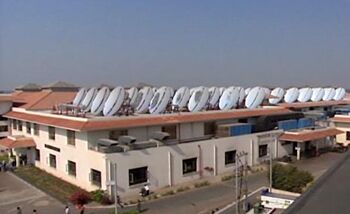
Shirdi roof collector array
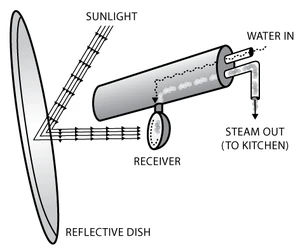
Shirdi collector array diagram
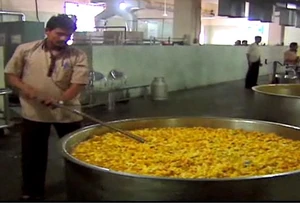
Cooking in the kitchen at Shirdi
- Rooftop solar installation feeds 50,000 people per day: Gadhia Solar Energy Systems Pvt. Ltd. completed installation of a solar steam cooking system, capable of cooking 40,000-50,000 meals per day. It is located at Shirdi Sai Baba temple in Shirdi, Maharashtra, India. With nearly 30,000 visitors each day, the temple’s dining halls are some of the largest in India. The solar steam cooking system is comprised of seventy-three rooftop-mounted Scheffler reflectors of sixteen square meters each. The dishes concentrate sunlight on receivers that contain water, generating steam that is piped down to the kitchen for cooking purposes. To maintain constant focus with the sun, the dishes automatically rotate throughout the day after being manually aligned once each morning. The solar steam cooking system is retrofitted to existing liquid petroleum gas-powered steam boilers that are still used in the evening and during prolonged periods of inclement weather. Though the solar steam cooking system cost nearly $300,000, government subsidies reduced the temple’s portion to about $170,000. Liquid petroleum gas use has been cut by roughly 100,000 kilograms each year, for an annual savings of approximately $45,000. The temple should recoup its investment in three to four years. According to company founder Deepak Gadhia, the solar steam cooking technology was originally developed in Germany. However, the equipment does not contain imported components, and is manufactured with local machinery and labor, creating much-needed jobs. Gadhia has adapted the system for use in India, and has installed 50 such systems of varying sizes over the past two decades. The March edition of CNN’s Eco Solutions program highlights the Shirdi Sai Baba temple solar steam cooking system.
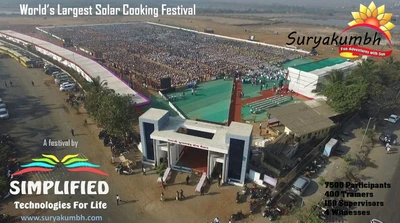
Aerial view of the 7,438 school children learning the basics of solar cooking at SuryaKumbh 2017 - Photo credit: Vivek Kabra
- SuryaKumbh festival again sets record for largest solar cooking workshop - Vivek Kabra reports: "On 11 Feb, 2017, 7,500 school children created history by participating in the World's Largest Solar Cooking Festival. Trained by 400 trainers and guided by 150 supervisors, each one of them made their own solar cooker and cooked noodles in it. Having experienced the power of the sun first hand, each child took the SuryaKumbh solar cooker back home to share the magic of cooking without fuel." The event this year was organized by the Mira Bhayander Municipal Corporation and held in the Bhayandar - Thane area. More information...
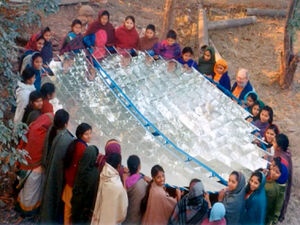
Jimmy McGilligan demonstrates a large parabolic solar reflector to local women. Photo credit: Janak McGilligan
- Jimmy McGilligan Centre for Sustainable Development and the Barli Development Institute for Rural Women - The long lasting partnership of Janak McGilligan and Jimmy McGilligan has provided a depth of solar cooking instruction for rural residents in India, beginning their work in 2008. Since that time, the two facilities, the Jimmy McGilligan Centre for Sustainable Development and the Barli Development Institute for Rural Women, have trained over 150,000 youths in solar cooking, and over 6,000 rural and tribal women from over 1,000 villages to be community workers and trainers for solar cooking. They have shown communities that solar cookers can prepare their traditional and community foods with no problem, and have supervised the installation of many Scheffler Community Kitchens. Their projects have helped the self esteem of the local women, and created opportunities for them to use solar cooking to establish businesses that continue to provide community revenue. Jimmy passed away in 2011, but as of 2022, Janak continues to carry on their valuable work. Watch Janak McGilligan recall their work at CONSOLFOOD 2022
News[]
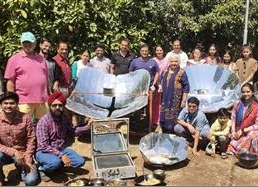
The men prepared a solar cooked lunch for the women, Photo credit: India News Calling
- NEW: March 2024: Men cooked and served a solar lunch for the women to celebrate International Women Day March 8, 2024 - Men organized and hosted a solar Lunch at Jimmy McGilligan Centre for Sustainable Development in the village Sanawadiya in India. They celebrated International Women's Day in a unique way. This year, many men specifically learned how to solar cooking, and cooked a solar lunch for the women. The event was attended by 30 participants, including Dr. Janak Palta McGilligan. Read more...

The Scheffler Community Kitchen installed for Shri Amarnath Ji Yatra 2023, Photo credit: Swaaha
- December 2023: Mega solar cooker in the Himalayan Mountains - A presentation was made at COP28 by Sameer Sharma, CEO and Co-founder of Swaaha. He relates the story of how large Scheffler Community Kitchen solar cookers were installed high in the Himalayan Mountains, for the two-month festival Shri Amarnath Ji Yatra 2023. The new solar cookers, while used in conjunction with biomass and biogas sources, generated considerable interest by providing a sustainable way to prepare three daily meals for over 2,400 Hindi pilgrims. In all, over 500,000 people, who visit the high-altitude holy site during the one month festival, viewed the solar cooker and received information on how they could have this technology at their own home locations. His presentation begins at 21:00 of the accompanying video, which begins with a worldwide solar cooking overview provided by Solar Cookers International personnel.
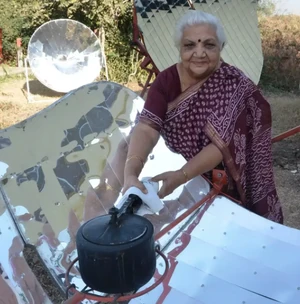
Janak McGilligan addresses the Solar Energy Conference 2023 in New Delhi, Photo credit: GeoTv
- November 2023: The Solar Energy Conference 2023, organized by Germany-based International Solar Energy Society (ISES), was held in New Delhi, India. Janak McGilligan was invited as a speaker at the “Solar Thermal Cooking” session. ISES has included Janak among the 200 Renewable Energy Pioneers of India in its commemorative booklet ‘Century of Solar Stories and Renewable Energy Vision’. Read more...
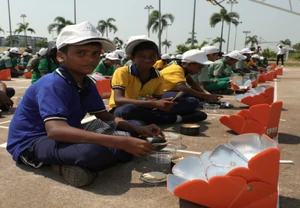
Over 400 school age children participated in the second Suryakumbh workshop in Bhubaneswar, Odisha, India on 15 October 2023, Photo credit: Campusvarta
- October 2023: Suryakumbh 2 2023 (Bhubaneswar, Odisha): - A second Suryakumbh workshop was held this year to commemorate the observation of World Students’ Day on 15th October. The Design Innovation Centre (Sponsored by Ministry of Education, Govt. of India), IIT Bhubaneswar, in association with the Unnat Bharat Abhiyan (UBA) and Entrepreneurship Cell of the Institute organized the workshop. 400 government school students from the five adopted villages and the migrant workers’ settlement of the Institute participated in this workshop. During the workshop, they received training on building and utilizing solar cookers for cooking, and baked cakes with their new solar cookers. Read more...

Ajay Chandak patent approval from the government of India, Composite Structure for Heat Storage, Patent #458401
- October 2023: Patent approval - Ajay Chandak has received Patent #458401 from the government of India for Composite Structure for Heat Storage. This innovation will be used for heat storage in solar cookers, enabling indoor cooking in the comfort of kitchen and allowing cooking even after sunset.
- October 2023: Computer science students learn sustainable living from Janak Balta McGilligan - A group of students from Soft Vision College Indore came to Sinawadiya in Madhya Pradesh, India, to conduct academic studies at the Jimmy McGilligan Centre for Sustainable Development. The students were amazed at the simplicity of using a solar cooker to harness the sun’s energy for cooking. Janak McGilligan maintains a zero-waste and zero-electricity lifestyle at her home and training center, and is an example of sustainability for us all to emulate. Read more...

Students from Soft Vision College Indore discover solar cooking with Janak McGilligan. Photo credit: Geo TV
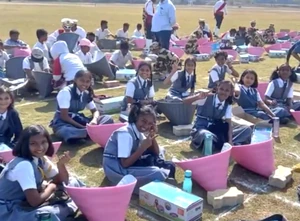
1000 children gathered at SuryaKumbh 2023 in Boisar, India, learning to assemble and prepare a meal with a solar cooker

A successful meal preparation, SuryaKumbh 2023, Boisar, India
- January 2023: Celebrating the joy of solar cooking with 1000 children - Vivek Kabra provided an update for this year's SuryaKumbh. Children assembled their own solar cookers and cooked their own meals using the same for the very first time. The CSR wing of NPCIL (Nuclear Power Corporation of India Ltd) provided the reflective solar panel cooker kits for the children attending from the Boisar metro area in India.
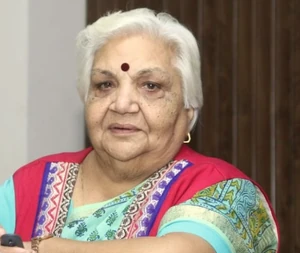
Janak McGilligan, Photo credit; the better india
- January 2023: Padma Shri Recipient Runs Zero-Waste Household - Janak McGilligan, Baha'i pioneer who established and developed the Barli Development Institute for Rural Women with her late husband Jimmy McGilligan , was interviewed by the better india to describe how she manages her zero-waste and zero-electricity lifestyle. Read more...
- December 2022: Bappu Deshmukh, designer and maker of the Sun Venture Smart Cooker, held a solar cooker construction workshop for a group of young students, in Roing northeast India. The group collectively made four box cookers and six Copenhagen Lotus Cookers. They left with a usable solar appliances to take home.
-
- See the solar cookers created at Bappu Deshmukh's student workshop

Prof. Soni demonstrates the operation of a parabolic solar cooker, Photo credit: India Times
- November 2022: During the three-day event between 20-21 November, Dr. Manoj Kumar Soni, an Associate Professor at BITS Pilani, and his team prepared a range of food items, including cakes, pizzas, and even sabudana khichadi to show the possibilities of cooking with solar thermal energy. Over the years, Prof. Soni and his team have trained hundreds of women from neighboring villages in the use of these solar cookers. Read more...
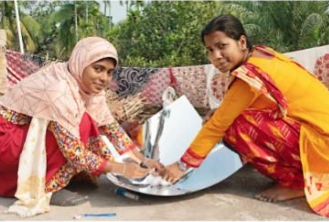
ICDS Center students assemble a Copenhagen Solar Cooker Light solar panel cooker as part of their alternative energy training, Photo credit: The Telegraph online
- November 2022: Student training in alternative energy - Students assemble and install appliances at an ICDS center in Howrah’s Domjur. The group were trained under a pilot project of the Pratichi Trust to assemble everyday appliances. This included assembling and using a Copenhagen Solar Cooker Light solar panel cooker. Read more...

GEDA solar cooking system in Latur, Maharashtra, India Photo credit: The Times of India
- October 2022: The Goa Energy Development Agency to install solar cooking system for the Central Reserve Police Force in Latur, Maharashtra. It will be used to cook food for about 1,000 people. The installation, which will cost around Rs 1.5 crore, will lead to saving of 171 kg of LPG per day. The system boasts a lifespan of twenty years and a payback period of 2.5 years. Read more...

Orjabox evacuated tube cooker demonstration, Photo credit: Orjabox
- September 2022: New solar cooking business in Pune - Orjabox was launched in 2018 by Vishakha Chandhere from her city of Pune, in Maharashtra. An engineer by education, she has worked in the environment and clean energy sector, and began experimenting with clean cooking to find sustainable alternatives to expensive LPG cylinders. Orjabox regularly hosts workshop demonstrations at the Rupa Rahul Bajaj Center for Environment and Arts in Pune, as well as online awareness sessions. They are able to tailor the right sustainable cooking equipment program for individuals and for commercial facilities as well.
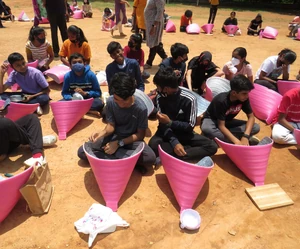
Children at the Suryakumbh event in Bengaluru, India Photo credit: Deccan Herald
- July 2022: Suryakumbh 2022 - Over 300 school students cooked together with 300 portable solar cookers in a first-of-its-kind event at a school in Karnataka. Prajna, a Class 7 student, who participated in the event called Suryakumbh, says, “We got to know more about solar cookers and how we can harness freely available solar energy with such simple technology. The food took 60 minutes to cook well as there was enough sunlight. Vivek Kabra, the founder of the solar company that organized this event, says, “We started this initiative called ‘Suryakumbh’ in 2012 to promote the idea of solar energy amongst school children between Classes four and 10. Cooking is the ideal way to connect children with solar energy because it gives them immediate feedback and there is a joy in it.” Read more...
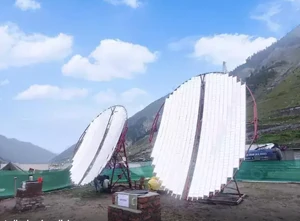
Scheffler Community Kitchens installed by DayStar volunteers at the Amarnath shrine, Photo credit: Mirror Now
- July 2022: Solar power and zero-waste for Amarnath - Volunteers with DayStar Solar Cooking Solutions have completed a sizable mission to install six parabolic solar cookers along the route to several high altitude temples in the Anantnag district of Jammu and Kashmir, India, as well as removing 1,500 metric tons of waste from the surrounding hillsides. Two of the largest solar cookers are Scheffler Community Kitchens located at Amarnath, along with four Prince-15s, two along the Baltal route and two along the Pahalgam route. This is to spread awareness against waste left behind and generated by hundreds of thousands of pilgrims visiting the revered cave shrine annually. Sunil Chouhan, the Director and Founder of Daystar, states the aim of this project is to make Amarnath Yatra, the benchmark of cleanliness and sustainability.” Read more
- April 2022: Pali village to go solar - Pali village located in the Samba District was visited by PM Narendra Modi to inaugurate a 500 kW solar plant. Sarpanch Randhir Sharma said, “Every house has been given solar cooker. Some families use wood as kitchen fuel. We are trying to provide them solar stoves.” Read more...
- November 2021: Building back Suryakumbh - Vivek Kabra, with assistance from Project Chirag, was able to organize and create the first Surkakumbh since 2019. He reported that sixty children from the tribal belt of Mokhada experienced the magic of solar cooking by cooking sumptuous poha without fuel, fire, or electrical heating.
- Children sit with their colorful solar cookers, Photo credit: Vivek KabraThe solar panel cookers are lined up, ready to begin cooking, Photo credit: Vivek Kabra
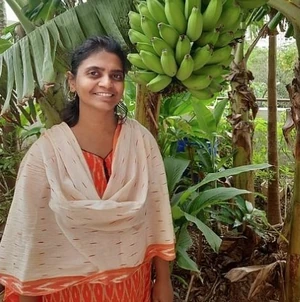
Pallavi Patil of Pune, describes the many ways she has reduced her LPG consumption with the help of solar cooking - The Better India
- November 2021: Reducing the family's LPG consumption - Pallavi Patil of Pune, has found many techniques for living more simply, and also resulting in lowering her familie's LPG consumption. She grows much of her own food, and realized they could live without air conditioning or a refrigerator. uses a solar box cooker, comprised of an insulated square box, a glass lid on the cooking tray and a mirror on its underside. The food placed in metal pots is cooked by the heat absorbed by a blackened surface. “Our gas cylinder used to last us for two months, but using a solar cooker helps me save 15 days’ worth of gas and half the labour. The food is cooked at stable temperatures and doesn’t require dedicated stirring." Read more...
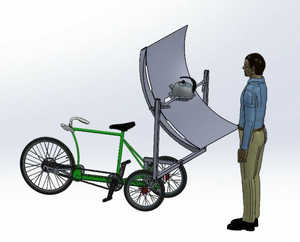
Suneel Chauhan has created a prototype for a mobile tea serving business. Image credit: Suneel Chauhan
- November 2021: Mobile bicycle tea service - A young entrepreneur from Indore MP, Suneel Chauhan, has begun testing a prototype system he calls the Solar Tea Stall on Cycle. A trough style solar cooker is mounted to the rear of a three wheel tricycle. When stopped it can quickly provide hot water for tea, and when traveling the trough reflector can be flipped forward to provide sun shading or rain protection for the rider. He hope is that this model will provide more employment opportunities for villagers. As well as tea, business owners can serve eggs, bread, paratha, and dal rice. Suneel is currently seeking mass production assistance, and can be reached at +91 6260 036385.
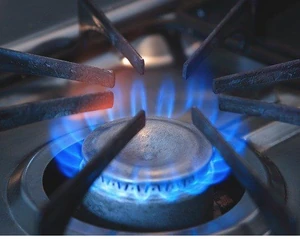
LPG gas burner, Photo credit: The CSR Journal
- September 2021: Cooking gas getting costlier every fortnight, worth the damage? The CSR Journal explores the situation occurring in India, where the cost of LPG gas is rising quickly. They consider the alternatives, and give credit to Bancha in Betul district, as the first village in India to have zero wooden stoves and almost no use for LPG cylinders, as the entire village has converted to using solar cooking appliances. Read more...

Deepak Gadhia, with Pranav and Bharat Gadhia, are on hand for the Scheffler reflector replacement at the Green Campus at Vankuva School
- February 2021: New reflectors at Vankuva School - Deepak Gadhia reports that the large Scheffler reflectors on-site are in the process of being replaced at the Green Campus at Vankuva School] in Gujarat, India. The original reflectors each measured 10m2, and the new ones measure 16m2. The new reflectors will be first used to test existing thermic fluid, and then converted and tested with the pressurized hot water system solar thermal system.
- September 2020: Prime Minister Modi calls for low-cost indoor solar cooking solutions - "In line with Prime Minister Narendra Modi’s call to action for developing low-cost indoor solar cooking solutions, IOCL has tied up with Sun Bucket System, a US-based start-up working in the niche area of solar energy-based products. We are encouraging Indian oil and gas companies to develop such innovative and scalable tie-ups in solar sector, which have the potential to make nationwide impact.” More information...
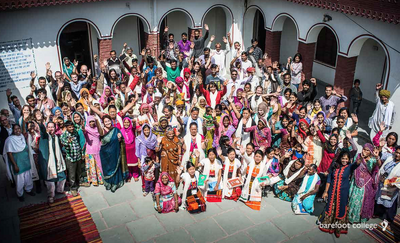
Recent Barefoot College graduates - Photo credit: Barefoot College
- September 2020: Meet These 'Solar Mamas' of Rajasthan - The community-based Barefoot College, located in Tilonia, encourages a hands-on-training process of gaining practical knowledge. Since 2004, Barefoot college has been teaching solar engineering skills to illiterate older women from rural communities. Women are indeed agents of change, which is why they are being trained to use solar cookers, desalination plants, and water heaters. They then return to their villages to establish projects and train others. Read more...
- September 2020: UN Secretary-General Calls on India to Take Lead in Global Transformation to Renewables - Mercom India
- December 2019: TinyTech Plants, founded by Veljibhai Desai, has announced it will be selling its current stock of solar cookers. Veljibhai will be retiring soon, and no longer wishes to maintain a marketing effort. The inventory includes the list below. If interested, contact TinyTech Plants:
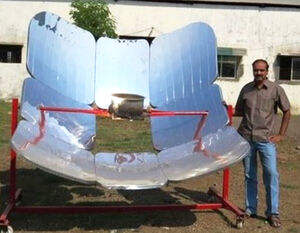
Ajay Chandak stands with the company's award winning PRINCE-40 Photo credit: PRINCE
- November 2019: The PRINCE-40 wins award - The PRINCE-40 parabolic solar cooker, designed to serve a community, has won a National Grand Challenge for designing a robust, efficient, and compact community solar cooker. The challenge was from Department of Science and Technology, Government of India. The award focussed on community solar cooker designs.
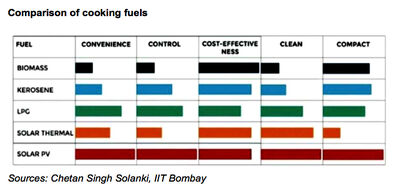
- November 2019: Electric cooking starts to simmer in rural India - Following the success of the Saubhagya initiative and its announcement of 100 per cent rural household electrification, efficiency gains and cost reductions in solar panels and batteries are opening up a new market that has the potential to avoid using any solid or fossil fuel, with solar-powered electric cooking or e-cooking using pressure and rice cookers and induction stoves gaining traction. The winner of the 2017 challenge, IIT Bombay, has since conducted a project to convert the entire village of Bancha in Madhya Pradesh to solar panels and induction cookstoves instead of wood-burning or LPG stoves. With Rs 8.5 million provided by ONGC, all the 75 houses in Bancha now rely on solar-powered electric stoves to meet their cooking needs. Besides reducing air pollution, villagers no longer have to collect firewood from nearby forests, saving time and effort. More information...
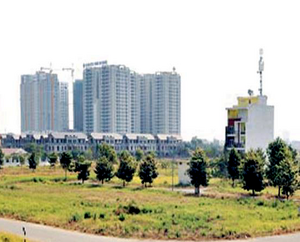
Around 24.75 lakh houses have been occupied under PMAY (Urban) - Photo credit: Financial Express
- October 2019: Modi govt to offer Ayushman, Ujjwala benefits for PMAY users in three month trial program - The government will not just cover these beneficiaries under schemes like Ujjawala and Ayushman Bharat, but will also offer them solar energy run devices like solar cookers, etc as part of its efforts to develop a holistic self-sufficient and sustainable urban cluster. Under PMAY (Urban), the ministry of housing and urban affairs (MoHUA) has sanctioned around 90 lakh houses so far, of which 53.40 lakh have been grounded (work started) and more than 27.17 lakh have been completed with an investment of around Rs 5.54 lakh crore. Around 24.75 lakh houses have been occupied. It was officially rolled out in all cities under PMAY (Urban) on October 2 and will conclude on December 10. The campaign is to commemorate the 150th birth anniversary of Mahatma Gandhi. More information...
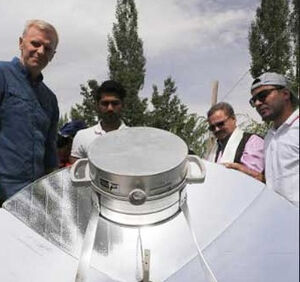
IndianOil director, Dr. SSV Ramakumar, unveiled the start of the indoor solar cooking program in Leh, Ladakh Photo credit; PSU
- September 2019: Oil company supports indoor solar cooking: - IndianOil has formed a partnership with the start-up company, Sun Buckets, to sponsor a test pilot program of their indoor solar cooking system in Leh, Ladakh. The Sun Bucket can be ‘charged’ using parabolic solar concentrators kept outdoors. Once charged, the system is capable of storing and discharging the thermal energy on demand for indoor cooking — for boiling, steaming, frying and to make roti. It has enough heat storage capacity to cater to cooking demands during the day as well as at night. More information...
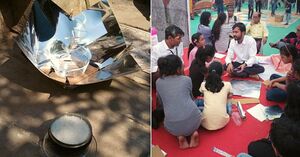
The model being built (left) and Alzubair Saiyed teaching a workshop (right)
- September 2019: Gujarat Man Teaches Tribal Women to Make Solar Cookers That Cost Just Rs 100! - The Better India (“We have organised the Solar Cooker Workshop in more than 100 villages till date. In the last two years, our initiative has reached many parts of Maharashtra and Karnataka as well. While on the one hand, many rural families have already begun using solar cookers successfully, on the other, we are working on setting up a solar cooker laboratory in the tribal village of Casa located in Palghar district of Maharashtra,” said Alzubair Saiyed.)
- July 2019: In the second week of July, Dr. Ajay Chandak will lead an environmental expedition to Ladakh to demonstrate the ability of solar thermal parabolic cookers to cook food and boil tea with the power of the sun even when snow is on the ground and temperatures are below freezing. Ladakh, a high-altitude desert with more than 325 clear sunny days and no locally available cooking fuel is an ideal region for cooking with solar thermal devices. Using solar cookers whenever the sun is shining can significantly reduce the amount of subsidized LPG fuel that residents of this region must currently purchase and import every year. Ajay and his team will demonstrate low cost, easy to use PRINCE solar cookers at schools and rural child care centers (Aanganwadis). They will carry out a solar cooking expedition to Khardungla Pass, at an elevation of 5360 mt (17585.2 ft) on the 10th of July. Ajay also plans to donate a PRINCE-40 solar community cooker to Indian Army personnel for pilot testing so that it can be used in remote outposts in this region where all cooking fuel must be imported at tremendous expense. Ajay has been instrumental in training and mentoring entrepreneurs from Ladakh since 2010. These entrepreneurs have manufactured and installed almost 1000 domestic solar cookers in the reg
- March 2019: Smart Solar Cooking Solutions Design National Challenge 2019 - The Department of Science and Technology, Government of India is providing young Indian innovators with a chance to submit their designs of efficient and user-friendly solar cooking solutions and win financial grants. Indian citizens affiliated to any academic institution, R&D organization and/or an Indian company/Industry recognized under the Company’s Act/DSIR may apply for this scholarship with their design ideas. The last date to apply for the challenge was 31 March 2019. [http://www.dst.gov.in/callforproposals/national-grand-challenge-awards-designing-user-friendly-smart-solar-cooking More information...
Articles in the media[]
- NEW: March 2024: From sun to plate: India yet to embrace solar cooking benefits - Mongabay
- NEW: March 2024: Over 70% of rural households use firewood for cooking in Nagaland - The Morung Express
- October 2023: IIT Bhubaneswar organizes ‘Suryakumbh’ Workshop to educate children on Solar Energy and Sustainability
- October 2023: Computer science students learn sustainable living from Janak Balta McGilligan, GeoTV
- May 2023: Not LPG, through solar-powered cooking, India can achieve net zero! - Ground Report
- January 2023: Sonam Wangchuk - An environmentalist who leads by example, Sonam promotes carbon-neutral approaches for the Ladakh region, which includes solar cooking applications. He will conduct a high altitude five day fast to raise awareness - Cross Barriers
- December 2022: Abhi and Niyu represented India at the 27th Conference of the Parties (COP27) in Egypt. They promoted sustainable climate solutions, which included solar cooking - The Hindu
- November 2022: Sun-Cooked Cakes And Pizzas? These Solar Cookers Can Get It Done Without Causing Any Pollution - India Times
- November 2022: Students assemble and install appliances at an ICDS center in Howrah’s Domjur - The Telegraph Online
- June 2022: World Environment Day was celebrated with the minister for water resources, Tulsi Silawat, and SCI Associate, Janak McGilligan - Free Press Journal
- April 2022: Samba: Palli village to be carbon-neutral in 18 months: Sarpanch - The Tribune
- March 2022: Solar-Cooked Lessons and Chicken Curry - titli trail
- December 2021: Couple Cooks Homegrown Veggies in Solar Cooker; Cuts Costs by Rs 20,000/Year - The Better India
- November 2021: Indore: Students marvel at varied uses of solar power at Janak McGilligan's centre - The Free Press Journal
- September 2021: CSIR-CMERI’s Solar DC Cooking System, a step towards green & pollution free India - NewsOnAir
- July 2021: Maharashtra: Jalna-based dentist makes sugar-free cookies using solar energy - mid-day
- June 2021: Electrification of 19 Siachen villages to help Ladakh achieve carbon-neutrality target - The Hindu
- May 2021: How Devang Joshi is helping farmers in becoming Atmanirbhar using the income generation model through Solar Dryers - Startup Times
- April 2021: Indore: People share their journey of solar cooking as an environment-friendly option, Jimmy McGilligan Memorial Week - The Free Press Journal
- March 2021: AIADMK seeks to outsmart DMK, unveils super populist manifesto for Assembly polls - The Tribune
- March 2021: Maharashtra aims to achieve 40 per cent electricity generation through renewable sources by 2030 - Frontline
- January 2021: Solar Cookers International: Clean Cooking Solutions - Indiaspora
- January 2021: Madhya Pradesh: Indore’s Janak Palta McGilligan gets international recognition for pioneering solar cooking - The Free Press Journal
- December 2020: Mahindra University's third annual R&D showcase, which includes a student solar cooker presentation winner - India EducationDiary.com
- December 2020: Use of solar cookers saved women from rape, exploitation, abuse and violence - Janak McGilligan, The Free Press Journal
- November 2020: Children’s Day 2020: Tribal kids conduct experiments away from artificial labs in Bhopal - The Free Press
- September 2020: Prime Minister Modi calls for low-cost indoor solar cooking solutions - domain-b.com
- September 2020: CSIR-CMERI and NISE to bolster the Solar Energy Sector - DD News
- August 2020: UN Chief Urges India To Kill Fossil Fuel Subsidies, End Coal Pledges After 2020 - Science the Wire
- June 2020: Unique ‘Solar Bowl’ Keeps Kitchen Cool Despite Using Steam to Cook 1,000 Meals a Day! - The Better India
- April 2020: Weeklong online lectures from 15 April in memory of great solar techie James McGilligan
- March 2020: Renewable Energy: How a shift towards energy access is transforming rural India - The Economic Times
- March 2020: Igniting a Solar Revolution - milleniumpost
- February 2020: Solar energy the future of city: Experts
- December 2019: Learn to Build Solar Cookers from IITian Who Quit His Job to Teach 1.2 Lakh Kids - The Better India
- October 2019: Here comes the sun - Pune Mirror
- October 2019: SECI tenders 500 quantities of solar cooking systems - PV Magazine India
- October 2019: Keeping the Mahatma’s light shining - Mongabay
- September 2019: Gujarat Man Helps Tribal Women Make Solar Cookers That Cost Just Rs 100! - The Better India
- September 2019: IOCL flags off pilot study of solar indoor cooking in Leh - Daily Excelsior
- September 2019: Indian Oil launches pilot study of indoor solar cooking at Leh - The State Times
- Gujarat Man Teaches Tribal Women to Make Solar Cookers That Cost Just Rs 100! - The Better India
- September 2019: #KindnessMatters: Engineer invents Rs 60 solar cooker to help rural women - CNBC TV18
- July 2019: IIT Roorkee, IIT Delhi and ARES (FBK) jointly execute ITPAR Project Titled "STAR" - webindia123
- July 2019: Union Budget 2019: A Mixed Bag for the Solar Industry - Saur Energy International
- June 2019: RK Singh reviews the issues pertaining to Renewable Energy sector, calls upon the lenders - Dariya News
- June 2019: Increasing the share of cleaner cooking among rural households of India - Observer Research Foundation
- June 2019: MP village goes completely solar for cooking needs - Times of India
- May 2019: Time To Replace LPG? This Gujarat Man’s Solar Stove Lowers Cooking Costs by 80% - The Better India
- May 2019: Increasing the share of cleaner cooking among rural households of India - Observer Research Foundation
- April 2019: On Mission to Save Environment, Gujarat Engineer Designs Solar Cooker That Costs Just Rs 100 - NEWS 18
- February 2019: Vocational Training On Preservation Of Fruits And Vegetables Concludes At Krishi Vigyan Kendra Fatehgarh Sahib - 5 Dariya News
- February 2019: StartupBharat: From solar stoves to 3D printing, four stories of innovation from Gujarat - YourStory
Audio and video[]
- July 2023: Solar Steam Cooking System (CST) at the Shirdi temple in India
- July 2023:
- November 2022:
James Dean Conklin- Filming "Family of the Sun"-2
A documentary interview conducted by Luther Krueger, of the Big Blue Sun Museum of Solar Cooking, with James Dean Conklin, who since the early 2000s, has spent considerable time researching the efforts of Deepak Gadhia and Janak and Jimmy McGlilligan
- March 2022:
- February 2022: Challenges in Promoting Solar Dryers in India. Presented at CONSOLFOOD 2022. Watch on YouTube.
- February 2022: The Scheffler kitchen used at Vatsalya has cooked over 150,000Kg of food, and paid for itself in four years. Presented at CONSOLFOOD 2022. Watch on YouTube.
- September 2020: - OrjaBox presents: Fuels used in Indian kitchens
- February 2017:
- June 2016: Deepak Gadhia tells the story his solar cooking research and promotion (Starts in German, but after one minute switches to English)
- May 2016:
- January 2016:
- June 2015:
- February 2015:
- July 2014:
- May 2013:
- February 2010:
- February 2010:
Solar Cookers in India, Global Ideas
Deepak Gadhia's efforts promoting various solar powered projects
- September 2007:
History[]
- Main article: History of solar cooking in India
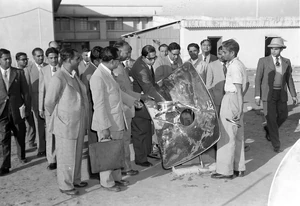
A solar cooking demonstration in Delhi in 1956. Photo credit: Wake-Up India
India, Asia's second largest country next to China, is second to China in the number of solar cookers in use. The situation in India has been more complex than that of China., and more is known about Indian programs. The Third World Conference on Solar Cooking was held in India, which permitted the history and progress of solar technology's uses to be better known around the world.
The Ministry of Non-Conventional Energy Sources (MNES), Government of India, was established in 1982, first as a Department and later as a Ministry. The Ministry's mandate extended well beyond solar cooking, including fuel efficient wood and charcoal stoves, power from other renewable sources, energy from industrial wastes, and research and development in a number of related fields (photovoltaics, biogas, and pollution prevention, for example). MNES began seriously to promote solar cooking in the early 80s, with an initial focus almost entirely on the solar box cooker.
The population of India is roughly 70% rural. MNES states, "cooking accounts for a major share of the total energy consumption in rural homes (Singhal, correspondence, 2003, p. 1). Sources of that energy use have been largely fuelwood, animal dung, or crop residues. All emit smoke, pollute the atmosphere, and are deterimental to health and safety of family members, particularly women. Fuelwood has become more scarce each coming year. FAO data show that 21.6% of the Indian land mass is forested, and conservation efforts have been in place to reverse previous loss. The effort has been affected by the large and dense population, and a slowing but still substantial birth rate (continuing to increase at 1.7% per annum, or 17% in a decade). Solar cooking has been viewed as one way to alleviate a number of India's problems and as such supported by government efforts.
- Main article: Institutional solar cooker designs
The Press Bureau of the Government of India reported in 2007 that there were 525,000 solar cookers installed in India. The Press Bureau also reported in 2003 that, "The solar cooker programme has been expanded by introducing new designs for community use. Three solar steam cooking systems based on automatic tracking concentrating collective technology for cooking food for 600-3,000 people per day, and one system based on ‘Solar Bowl’ technology, have been installed. World's largest solar steam cooking system has been installed at Tirumala Tirupati. The system is designed to cook two meals for 15,000 persons in one day. Another system for 2,000 people was erected at Brahmakumaris Ashram in Gurgaon in July, 2002. Three community cookers for indoor cooking have been installed at a training hostel and an NGO’s establishment in Leh. In all, six such systems have been installed under the MNES demonstration scheme. A total of 500 dish solar cookers and 60 community solar cookers have been installed so far."
External links[]
- April 2023: The poor woman’s energy: Low-modernist solar technologies and international development in India and Mexico, 1878–1966 - Cambridge University Press
- Main article: History of solar cooking
Archived articles
- Aga Khan Foundation
- Applied Science and Engineering
- C.K. Rohatgi
- C. Palaniappan
- Clique Solar
- Dinkar Verma
- EduCARE India
- Gadhia Solar Energy Systems
- Girja Sharan
- Haryana Renewable Energy Development Agency
- Jalpaiguri Akshay Rural Technology and Renewable Energy Entrepreneurship Development Centre
- Jimmy McGilligan
- Mathew SJ Muthuplackal
- Navratna Nahar
- Rohitas Electronics
- Sankha Subhra Datta
- Sathyavathi Muthu
- Shirin Gadhia
- Sol-Café
- Solar Health and Education Project
- Sun BD Corporation
- Sunil K. Somani
- Veerabhadran Ramanathan
- Veljibhai Desai
Climate and culture[]
Solar Cookers International has rated India as the #1 country worldwide for solar cooking potential. In the year 2020, the estimated number of people in India who will suffer from fuel scarcity is 157,400,000, but these people will continue to have ample access to the sun. In December 2007, the Indian Government instituted a program of rebates on various renewable energy devices including solar cookers. Solar cooking has even been recommended in the Rig Veda, a sacred Hindu text, stating: "All edibles ripened or cooked in the sun’s rays change into super medicine, the amrita."
 India Solar Resource Map provided by the National Renewable Energy Laboratory |
Fuels used for cooking[]
URBAN SECTOR
- LPG (47.96%)
- Firewood (22.74%)
- Kerosene (19.16%) and
- Other fuels (10.14)
RURAL SECTOR
- Firewood (64.10%)
- Other sources of biomass – crop residue (13.10%)
- Cow‐dung (12.80%)
- LPG (5.67%) is now increasing in importance. [1]
In a February 7th, 2015 article, The Economist reported that there are roughly 1 million deaths in India each year due to cooking fires[2].
Fuel subsidies[]
The Economic Times of India reports:
- While 300 million people live below poverty line, making do with energy inefficient dung cakes, twigs and branches, and occasional bits of coal, the urban middle class and the rural rich are splurging on cheap petrol and diesel and even cheaper kerosene and liquified petroleum gas.
- The subsidy is massive - hidden by a disingenuous device called oil bonds. Here are some rock solid facts. IOC, HPCL and BPCL are currently losing $137 million a day (i.e., Rs 582 crore per day at Rs 42.50 = $1). They lose Rs 16.34 for each litre of petrol, and Rs 23.49 for each litre of diesel sold in Delhi.
- The subsidy on kerosene at Rs 28.72 per litre is over three times the current retail price; and the subsidy on a cylinder of cooking gas at Rs 306 per cylinder exceeds the retail price. The total under-recovery for the oil marketing companies for 2006-07 was over $19 billion. With oil prices touching $135, under-recoveries can be $50 billion this year, unless retail prices are substantially increased.[3]
The Telegraph (UK) reported in September 2013 that, "Food and fuel subsidies are gobbling up much of the budget, while investment atrophies."[4]
Solar cooking already has a significant presence in India, especially with large-scale projects, but the potential largely remains untapped for its use to significantly replace the use of conventional fuels.
Cultural acceptance[]
In a report presented during the Asian Clean Energy Forum in June 2008, Soma Dutta, Asia Regional Network Coordinator for the Amsterdam-based ENERGIA International Network on Gender and Sustainable Energy, states that only 45% of India’s 70% rural population have access to electricity, and over 80 percent still rely on firewood as their primary cooking fuel, the gathering of which is a responsibility that almost always falls to the women and girls in a society. The long hours and significant effort spent simply gathering firewood leaves them little time for education or employment. [5]
Introductions of new technologies fail in villages for many reasons, but most commonly due to a lack of knowledge and understanding of local cultural customs. Solar cooking has often suffered this fate despite the purported cost savings because it is not introduced in a way that suited the lifestyles of the individuals using it.
A solar stove is most powerful at the times of the strongest sunlight, which is mid-day and early afternoon. As in many agricultural populations, village farmers in India consume their biggest meals by early to mid-morning and then again late at night, after the sun has set. In addition, certain solar stoves are not conducive to Indian-style cooking which is done mostly with oil (with the exception of rice) and requires frequent temperature manipulation as well as stirring and flipping which was is difficult with many solar cookers.[6]
While technical constraints limit the types of solar cookers likely to be widely adopted in India, there is historic precedent for solar cooking in Indian culture. A passage in ancient Vedic texts state, " Sun cooked food improves cellular health and longevity of life. It strengthens health and mind removes three major physical disorders to do with digestion, blood and respiratory system, balances inner body temperatures, life, glows aura and keeps various obstacles away. Sun cooked food has great medicinal value. It enhances intellect, genius." ' Rig Veda'. - Reference from the princeindia.org website. See: PRINCE
See also[]
- The climate of India - Wikipedia
- India Energy Situation - Energypedia
- Enhancing the acceptance of solar cooking in India - Lt Col Dinkar Verma (Retd)
- June 2015: Women Spend 374 Hours Each Year Collecting Firewood in India, Study Finds - Global Alliance for Clean Cookstoves
- March 2015: Will mini-micro solar remain a toy for the middle-class and rich in India? - Moneylife
- November 2012: Explaining the Unexpectedly Low Use of Solar Cookers in Gujarat, India - Girja Sharan and Raju Pandya
- July 2006: Integrated Approach for Promoting Solar Cookers in Rural Areas of Tamil Nadu - Dr. Sathyavathi Muthu and Ms. G. Anuradha
- July 2006: Dissemination of Solar Cooker Information - Mamata Dutta
- July 2006: Sustainable Energy Policies for Promotion of Solar Cookers in India - Sudha Mahalingam
- An Analysis of Solar Cooker Usage - Bashir Ahmad
- Solar cooker dissemination and cultural variables
Resources[]
Possible funding[]
Facebook groups[]
- Solar Cooker India
- Solar Cooking Campaign for Grassroots
- Solar Cookers - DayStar Solar Solutions @DayStarSolarCo
Blogs and newsletters[]
Project evaluations[]
- April 2014: A (new) cultural turn toward solar cooking—Evidence from six case studies across India and Burkina Faso
- January 2013: Performance Evaluation of Parabolic Solar Disc for Indoor Cooking - Yogesh Suple & S.B. Thomre
- Main article: Project evaluations
Photographs[]
Documents[]
- May 2019: Experimental investigation of 16 square meter Scheffler concentrator system and its performance assessments for various regions of India - S. Kumar, V. Yadav, U. Sahoo, and S.K. Singh
- January 2018: Introduction of Solar Drying by NGO Narmada in Nimar Region of Madhya Pradesh State of India Under the Guidance of Barc, Goi - Raghav Deosthale, et al
- January 2018: Solar Concentrator Evoluation in India and Way Ahead (Slides, Abstract) - Deepak Gadhia
- April 2017: Solar Cooking Journey - Alzubair Saiyed
- Challenges in Promoting Solar Cookers in India (Slides, Abstract) - Neha Mehta, et al
- June 2016: Health and Climate-Relevant Pollutant Concentrations from a Carbon-Finance Approved Cookstove Intervention in Rural India - Ther W. Aung, et al
- July 2015: Gujarat Solar Power Policy-2015 - Government of Gujarat
- June 2015: Women Spend 374 Hours Each Year Collecting Firewood in India, Study Finds - Global Alliance for Clean Cookstoves
- August 2014: ARUN®100 Installation at Akshardham Temple, New Delhi - Ajay Chandak
- August 2014: ARUN®100 with Thermal Storage at Ramkrishna Mission, Chennai - Ajay Chandak
- June 2014: A (new) cultural turn toward solar cooking—Evidence from six case studies across India and Burkina Faso - Pia Otte
- May 2013: Manufacturers of Box Type & Dish Type Solar Cooker - Ministry of New and Renewable Energy
- November 2012: Explaining the Unexpectedly Low Use of Solar Cookers in Gujarat, India - Girja Sharan and Raju Pandya
- November 2012: Bashir Ahmad, a Research Fellow at the Technical University of Denmark, provides an analysis of solar cooker usage compared to conventional cooking methods. Data was collected for the study in India and Burkina Faso in the 80's and 90's. An Analysis of Solar Cooker Usage - Bashir Ahmad
- February 2012: Patricia McArdle attended a workshop dealing with the construction and proper alignment techniques for Scheffler Community Kitchens in Dhule, India: Read her report.
- Spring 2009: Solar Box Cooker for Gujarat, India - Ashok Gadgil
- January 2009: Watermelon Processing in Integrated Solar Heater, Cooker, and Dryer - P.C. Pande
- January 2009: Thematic Studies for Processing and Preservation of Foods with Solar Energy - Ranjita Bezbaruah Sharma
- January 2009: Fortification of Solar Dried Fruit Bars -G. Sarojini, V. Veena, M. Ramakrishna Rao
- January 2009: Perspectives of Solar Food Processing in India - C. Palaniappan
- January 2009: Micro-Enterprises in Solar Food Processing - M. Ramakrishna Rao, D.J. Rao, S.L. Kumar
- January 2009: Food Processing Through Solar Energy - Ghanshyam Lukhi
- January 2009: Promotion of SK14 Solar Cookers through an Eco Center- Case Study of a Unique North-South Co-operation - Dr. Shirin Gadhia
- January 2009: Promotion of Smoke Free Villages in Chittoor District & Employment Generation to Rural Youth - Jagadeeswara Reddy
- January 2009: Advancing towards achievement of Millennium Development Goals by training Rural and Tribal women in Solar Food Processing - A Hands-on Experience at Barli Development Institute for Rural Women in Central India - Dr. Janak Palta McGilligan
- August 2008: A Solar Cooking Day
- July 2006: Disseminsation of Solar Cooker Information - Mamata Dutta
- July 2006: Sustainable Energy Policies for Promotion of Solar Cookers in India - Sudha Mahalingam
- March 2003: India's solar cooker program - Solar Cooker Review
- June 2001 S. Narayanaswamy Sheds Light on Solar Cooking - India Together
- May 1999: Solar Cooking Technology - How Far are Technology Promoters and Users From Each Other?
Contacts[]
The entities listed below are either based in India, or have established solar cooking projects there:
SCI Associates[]
- Ajay Chandak
- Alzubair Saiyed
- Deepak Gadhia
- Foundation for Sustainable Technologies
- International Center for Networking, Ecology, Education and Re-Integration
- Janak McGilligan
- Jimmy McGilligan Centre for Sustainable Development
- Kinarkumar Patel
- Orjabox
- Promoters, Researchers and Innovators in New and Clean Energy
- Solar Cookers India
- Sun BD Corporation
- TinyTech Plants
- Main article: Solar Cookers International Association
NGOs[]
- 100 Suns
- Aga Khan Foundation
- Auroville Solar Kitchen
- Barli Development Institute for Rural Women
- Brahma Kumaris
- Climate Healers
- Foundation for Sustainable Technologies
- Friendly Appropriate Solar Technologies
- International Center for Networking, Ecology, Education and Re-Integration
- International Institute for Applied Systems Analysis
- Jimmy McGilligan Centre for Sustainable Development
- Keshav Srushti
- Lady Fatemah Trust
- Malaviya Solar Energy Consultancy
- Naandi Foundation
- Promoters, Researchers and Innovators in New and Clean Energy
- SELCO Foundation
- Simplified Technologies for Life
- Solar Alternatives and Associated Programmes
- Solar Cookers India
- Solar Cooking Campaign for Grassroots
- Solare Brücke
- Solare Zukunft
- The Energy and Resources Institute
- Tirumala Tirupati Devasthanam
- Uttarakhand Renewable Development Agency
- WISIONS of Sustainability
- Women Barefoot Solar Cooker Engineers Society
Manufacturers and vendors[]
- DayStar Solar Cooking Solutions
- Ecoo
- EnKing International
- FUTEK
- Fair Fabricators
- Foundation for Sustainable Technologies
- Indiamart
- Kivu
- Malaviya Solar Energy Consultancy
- Manik Solar Innovation
- Orjabox
- Promoters, Researchers and Innovators in New and Clean Energy
- Radha Energy Cell
- Ravindra Pardeshi
- Redsun Solar Industries
- Rudra Solar Energy
- SOLA Solar Cooker 1
- Simply Solar
- Solar India
- Su Solartech Systems
- SunVenture
- Sun Oven India
- Sundish
- Sunrise CSP
- Tapi Food Products
- TinyTech Plants
- UNesar Private Limited
Individuals[]
Government agencies[]
Educational institutions[]
See also[]
- 6th SCI World Conference 2017
- ARUN 100
- Category:Andhra Pradesh
- Category:Arunachal Pradesh
- Category:Assam
- Balcony Solar Cooker
- Bamboo Solar Cooker
- Category:Bihar
- Category:Chhattisgarh
- Community Solar Cooker 10 SQ MT
- Category:Delhi
- Domestic Parabolic Solar Cooker
- Category:Goa
- Category:Guirat
- Category:Gujarat
- Category:Haryana
- Category:Himachal Pradesh
- History of solar cooking in India
- India news archive
- International Solar Food Processing Conference 2009
- Category:Jammu and Kashmir
- Category:Jharkhand
- Category:Karnataka
- Category:Kerala
- Low-cost Tile Box Cooker
- Low-cost Wooden Solar Box Cooker
- Category:Madhya Pradesh
- Category:Maharashtra
- Making the Most of Sunshine
- Manik Parabolic Cooker
- Manik Trough Cooker
- Category:Manipur
- Category:Meghalaya
- Category:Mizoram
- Category:Nagaland
- Category:National Capital Territory of Delhi
- Category:Odisha
- Category:Orissa
- PRINCE-40
- Parabolic solar concentrator for industrial heating
- Category:Punjab
- Category:Rajasthan
- Saracon
- Category:Sikkim
- Smoke-Free Village
- SolaCooka
- Solar-roasted peanut butter plant
- States of India
- Category:Tamil Nadu
- Category:Telangana
- Category:Tripura
- Universal Engineers Enterprise
- Category:Uttar Pradesh
- Category:Uttarakhand
- Category:West Bengal
References[]
- ↑ http://static2.wikia.nocookie.net/__cb20090624234723/solarcooking/images/8/8f/Performance_analysis_Solar_Parabolic_concentrator_for_cooking_applications_P._Rajamohan%2C_S._Shanmugan%2C_K._Ramanathan%2C_D._Mutharasu_%28January_2009%29.pdf
- ↑ http://www.economist.com/news/leaders/21642172-narendra-modi-should-learn-chinas-mistakes-its-too-late-indian-winter?fsrc=scn/fb/te/pe/ed/indianwinter
- ↑ http://economictimes.indiatimes.com/Debate/How_to_deal_with_ever-rising_crude_prices/articleshow/3094985.cms
- ↑ http://www.telegraph.co.uk/finance/currency/10277392/India-pushes-shock-and-awe-currency-plan-to-save-BRICS.html
- ↑ http://www.ipsnews.net/news.asp?idnews=42725
- ↑ http://www.travelblog.org/Asia/India/Andhra-Pradesh/Hyderabad/blog-449965.html4

